#TCHAIKOVSKY IS NOT AN ISOLATED CASE
Text
Book recs: possession, bodysnatching and bodysharing
Demons, ghosts, aliens, sentient bacteria, artificial intelligences - isn't there something fascinating about the idea of sharing a body with another being like a giant get-along t-shirt? No? Too bad, because I'm going to tell you about books featuring this trope anyway.
A note: multiple of these books are sequels where the bodysnatching/possession aspect plays little to no part in the first book. In all these cases, I still recommend starting with book one. I also in one case chose not to include a certain sequel that I loved as even mentioning it in this context would be a huge spoiler, so, uh, sorry about that.

For more details on the books, continue under the readmore. Titles marked with * are my personal favorites. And as always, feel free to share your own recs in the notes!
If you want more book recs, check out my masterpost of rec lists!
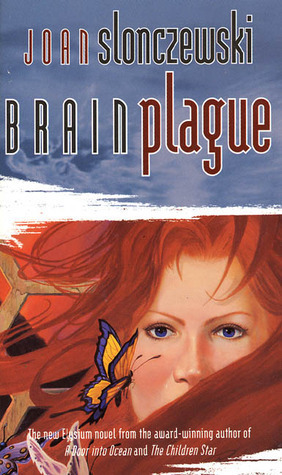
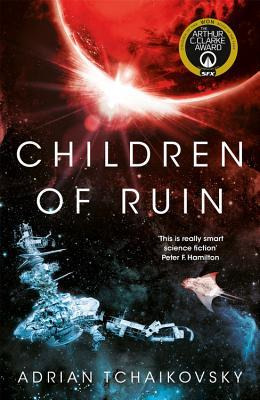
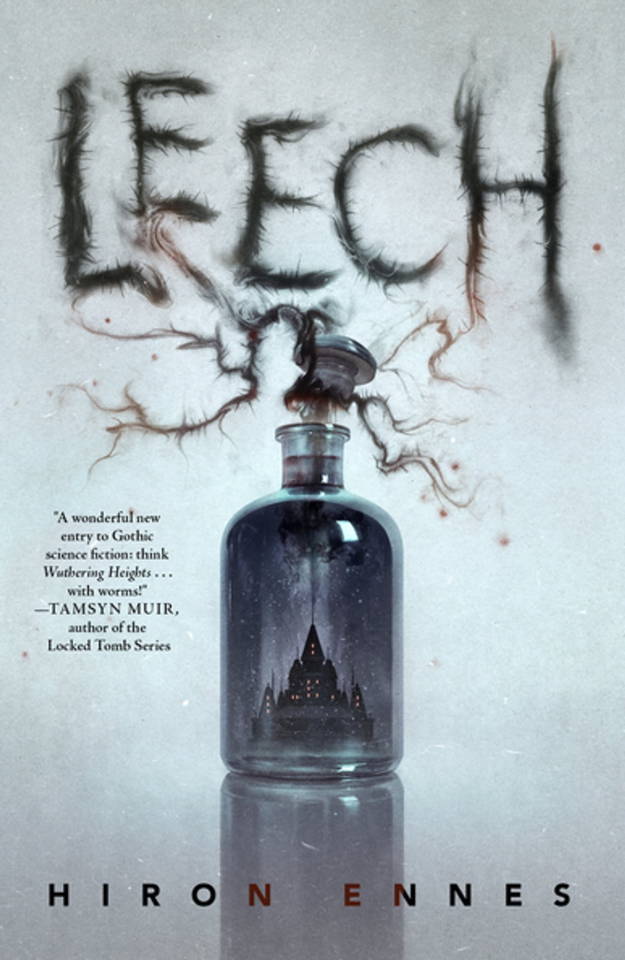
Brain Plague by Joan Slonczewski*
Chrys, a struggling artist, agrees to become a carrier for a sentient strain of microbes. With their help, Chrys breathes new life into her career and becomes a success. But every microbe society is different - some function as friends and brain enhancers to their carrier, while others become a literal brain plague, a living addiction taking over the life of their carrier. And like every society, the microbe community is in constant flux - including the one inside Chrys's head.
Children of Ruin (Children of Time series) by Adrian Tchaikovsky*
Sequel to Children of Time. Millenia and generation spanning scifi. After the collapse of the Earthen empire, a project to terraform various planets and use them to uplift other species to sentience in left unfinished. However, both species and planets continue evolving on their own, and when what remains of humanity flees the dying Earth millenia later, these planets might be their only hope of survival. But the uplifted species aren't the only intelligent life out there, and are far from the most dangerous as the survivors encounter something capable of terraforming the human body itself.
Leech by Hiron Ennes*
Unbeknownst to humanity, a sentient hive mind has taken over the entire medical profession to ensure the health of their host species. One of their doctors is sent off to an isolated location where they’re cut off from the rest of the hive mind, only to realize they’re faced with a rivaling parasitic entity. Leech hands you only just enough information to get by, and whether its historical fantasy, an alternate timeline, or futuristic post apocalypse is hard to determine. It’s spooky and a bit weird and wildly creative.
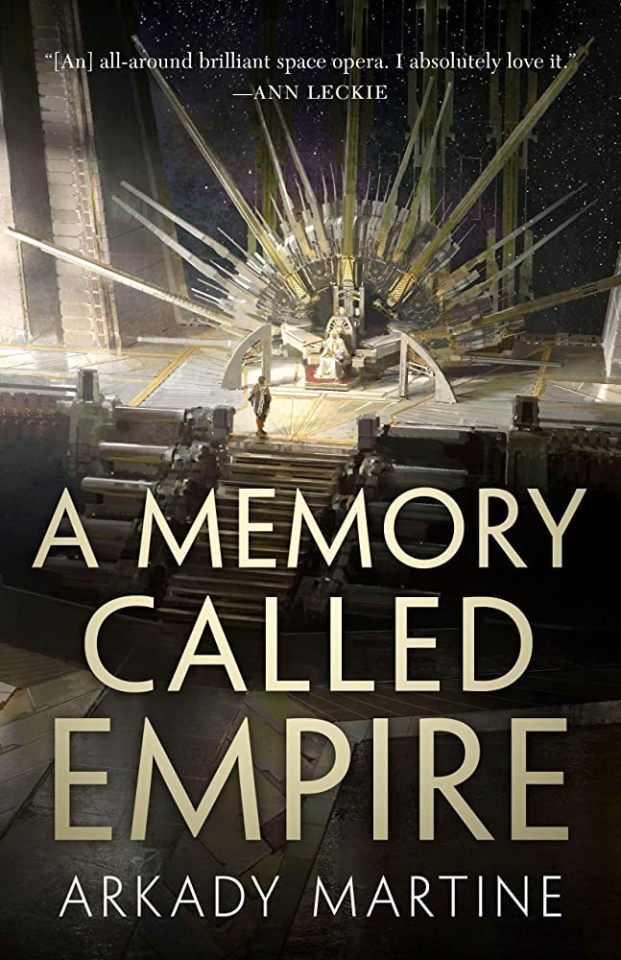
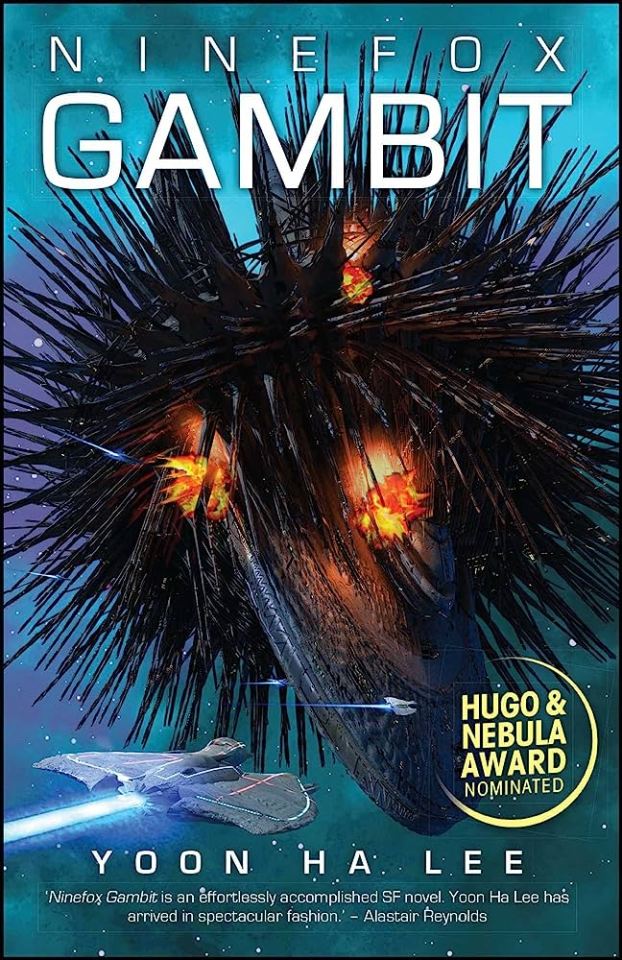
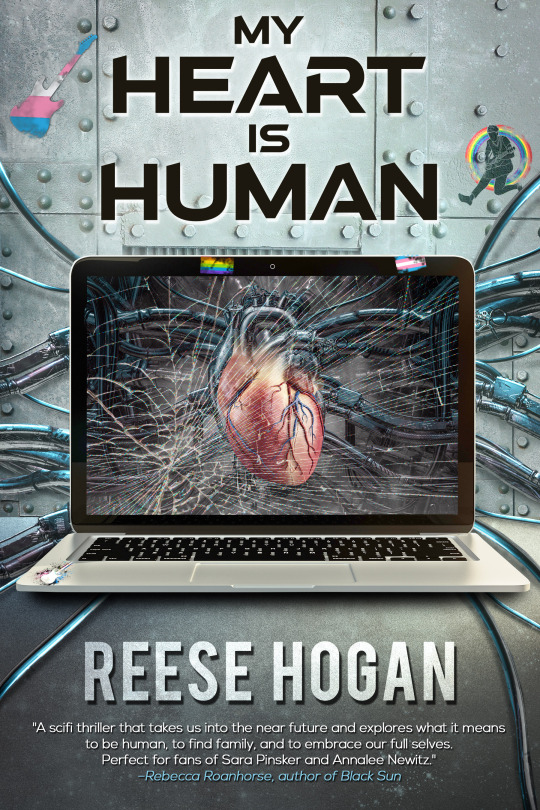
A Memory Called Empire (Texicalaan duology) by Arkady Martine
Mahit Dzmare is an ambassador sent to the center of the multi-system Teixcalaanli Empire, where she discovers that her predecessor has died. Trying to protect her home, a small independent mining station, from being taken over by the empire, Mahit struggles to find out the truth of her predecessor's death while carrying the voice of his ghost in her head, guiding her as best he can. Features a sapphic relationship but focuses more on world-building than romance.
Ninefox Gambit (Machineries of Empire trilogy) by Yoon Ha Lee*
Military space opera where belief and culture shape the laws of reality, causing all kinds of atrocities as empires do everything in their power to force as many people as possible to conform to their way of life to strengthen their technology and weapons. It’s also very queer, with gay, lesbian and trans major characters, albeit little to no romance. Disgraced Captain Kel Cheris is given a second chance by allying with the undead Commander Shous Jedao, who in life never lost a battle, but also went mad and massacred his own army. Now, Cheris must decide just how far she can trust him, with her forces as well as with her sense of self.
My Heart is Human by Reese Hogan
Nine years ago, all complex technology was made illegal. This complicates life for Joel, young transgender single father, as a bionic just uploaded itself into his brain without consent. Scared of losing his daughter, Joel tries to keep the bionic secret while using it to fix his life, but things quickly get more complicated as the bionic gains more and more control of his body. A bit simplistic in writing style but makes a lot of cool parallels of bodily autonomy to Joel’s experiences as a transman.
Bonus rec: if you like the general concept of struggling for physical control over one’s body with an AI, may I also suggest the (much grittier and gory) movie Upgrade.

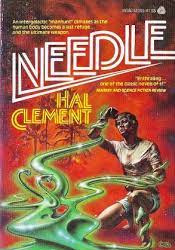
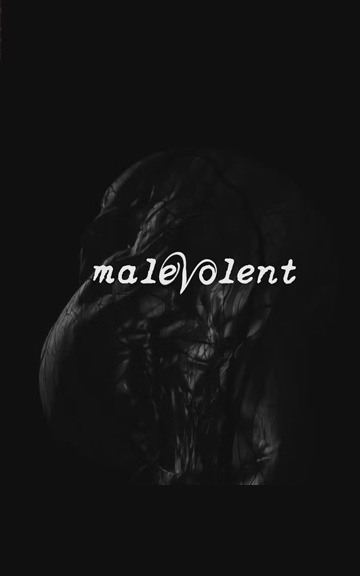
The Host by Stehpenie Meyer*
The Host follows Wanderer, an alien part of an invading force on Earth. Humans have been defeated and are being used as host bodies, but Wanderer's host Melanie is being difficult and refuses to fade away. Instead she fills Wanderer's mind with images of Jared, the man she loves and who's still in hiding. With Melanie's feelings bleeding into Wanderer's the two reluctantly ally to find and keep safe the man they both love. While The Host does feature Meyer's trademark romance - of which I'm not the biggest fan - the more interesting and arguably more central relationship is that between Wanderer and her human host.
Needle by Hal Clement
1950s classic. A small island in the pacific ocean and a fourteen-year-old boy have just become the center of an interstellar chase between an alien Hunter and the criminal he’s pursuing. Robert is a regular boy, but he has a very special passenger: an alien symbiont hiding inside his body. The alien became stranded on Earth as he pursued a criminal of his own species, and now they are both trapped on the same island, playing a game of cat and mouse as Robert and the Hunter struggle to find their prey before it finds them.
Malevolent by Harlan Guthrie*
Lovecraftian horror mystery. Private detective Arthur Lester wakes up in his office, his partner dead, memories fuzzy, vision gone, and the voice of a malevolent entity in his mind. Unable to see, Arthur is forced to rely on guidance from the entity as he attempts to solve the mystery of what it is and where it came from. Is this a book? No. But as someone who reads mostly audiobooks, the difference between a book and a fiction podcast is negligible, and also I love this story and its characters and want all of you to do so too.
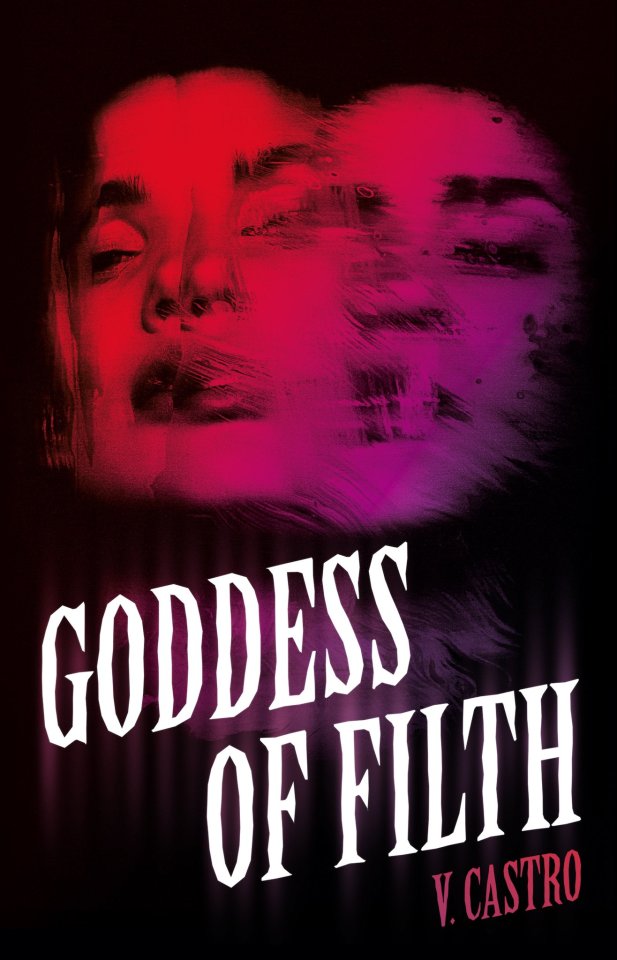
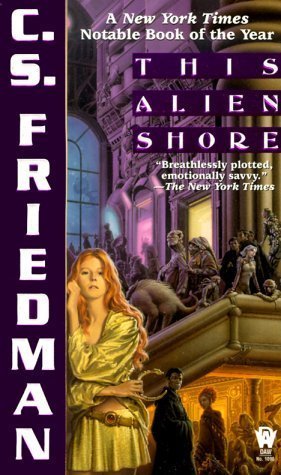
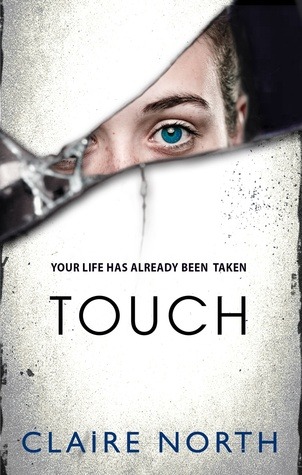
Goddess of Filth by V. Castro
Novella. What starts as a drunken seance between friends ends with one of them chanting in Nahuatl, the language of their Aztec ancestors. Following that night, the formerly shy Fernanda has changed. While her family calls for priests, claiming her possessed by a demon, Fernanda's friends believe what has taken up residence in her is something decidedly older. A quick read featuring female rage, desire and empowerment, this is a different twist on the typical possession story.
This Alien Shore by C.S. Friedman
Space opera in which humanity found a way to faster than light travel and began establishing colonies all over the galaxy, only to belatedly realize the method of FTL caused irreversible mutations and disabilities and leaving their nascent colonies to die. Much later, many of the colonies have survived and thrived, and one has found a new method of FTL travel, allowing an interconnected space society to grow. However, Earth is on the hunt for their method and is prepared to do anything to steal it. Trapped in the middle of all this and forced on the run is young Jamisia, who is little by little coming to realize that not only might she be the very solution Earth is after, she's also not alone in her own mind and body.
Touch by Claire North*
Kepler should have died long ago, beaten to death in an alley. Instead, a switch happened as Kepler leapt into and took control of the body of the killer. Since then, Kepler has lived in body after body, having gained the ability to inhabit anyone with a touch and stay for anything from a few minutes to an entire lifetime. Kepler cares much for the host bodies, and when one of them is brutally assassinated, Kepler must find the killer, avenge the host's death, and stop it from happening again. You want a fucked up main character with fucked up morals who still genuinely cares for people? Then boy do I have the book for you!
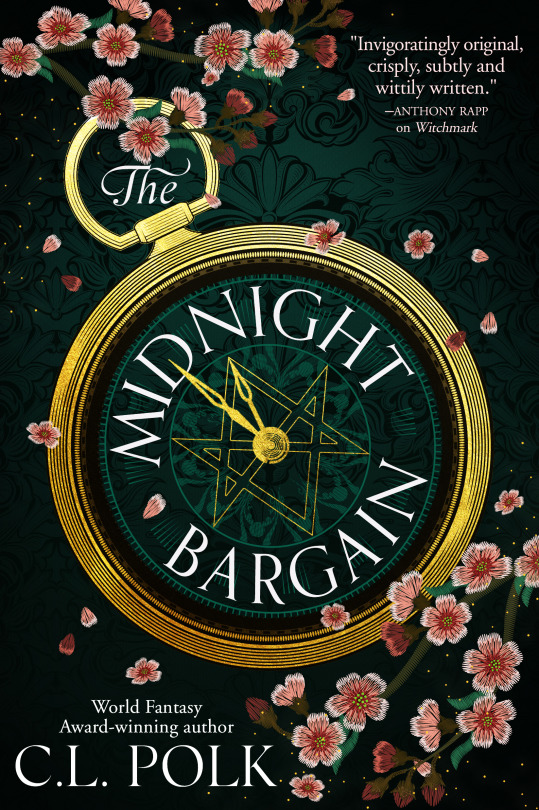
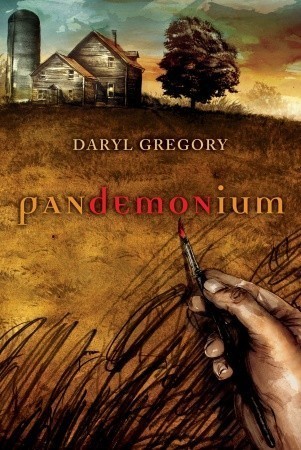
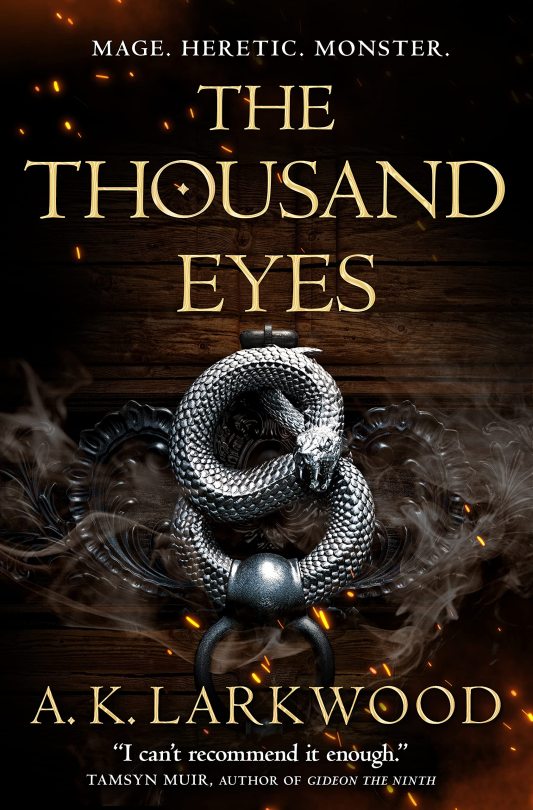
The Midnight Bargain by C.L. Polk
Fantasy romance. Beatrice Clayborn is a sorceress, but if her family gets its way she won't remain so for long. Married women are forbidden from practicing magic, and Beatrice's father is intent on marrying her off to save them from destitution. Beatrice has a different plan: become so powerful a sorceress that she can herself save her father's business and becomes too valuable to marry off. To achieve this, she strikes a bargain with a minor spirit of fortune. In return, the spirit demands to be present in Beatrice's body as she experiences her first kiss... a kiss with a man who might jeopardize all her plans.
Pandemonium by Daryl Gregory
Del Perce's world is almost indistinguishable from ours, the only difference being the presence of possessing entities that can strike with little to no warning. When he was young, Del was possessed by one of these demons, which was eventually exorcised. But now he’s experiencing a resurgence of symptoms, a voice in his head demanding to be freed. To save himself, Del races to find out the truth behind the possessions.
The Thousand Eyes (The Serpent Gates duology) by A.K. Larkwood*
Sequel to The Unspoken Name (please read that first, I promise this duology is very worth it). These books have a lot going on: portals, flying ships, orcs, elves, creepy snake gods, possessions, cults, immortal evil mages who traumatize teens as their hobby, gay and lesbian frenemies, the works. Csorwe, born and raised in a cult and meant as a sacrifice, escapes her intended death with a mage who becomes her mentor. But he has dangerous motives of his own, and Csorwe must decide where her loyalties lie.
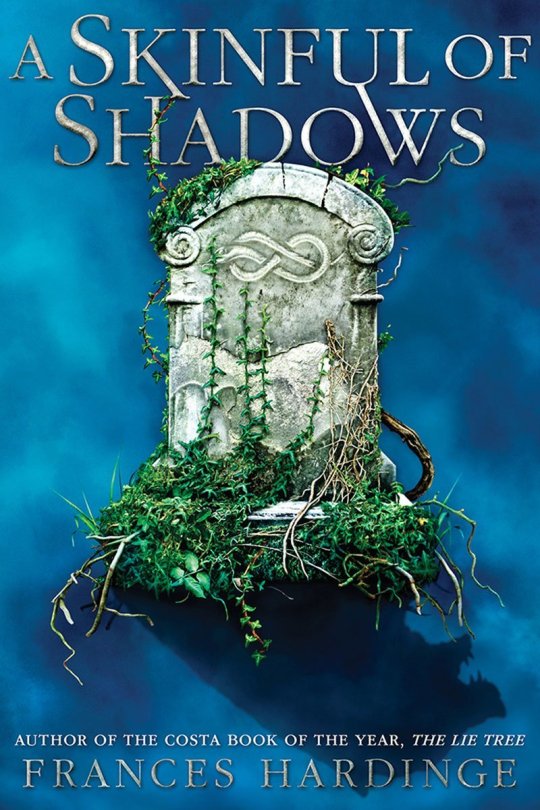
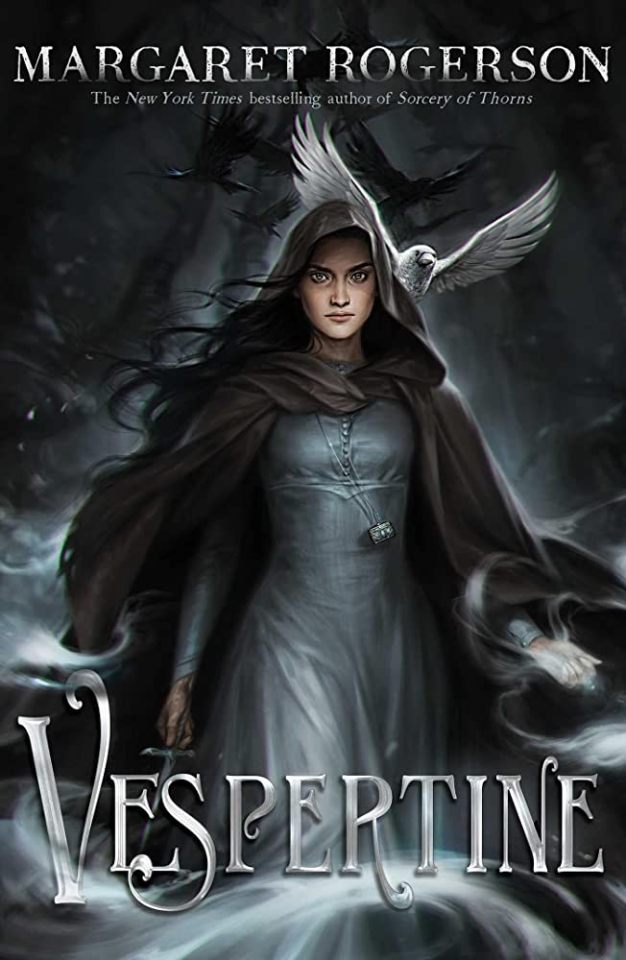
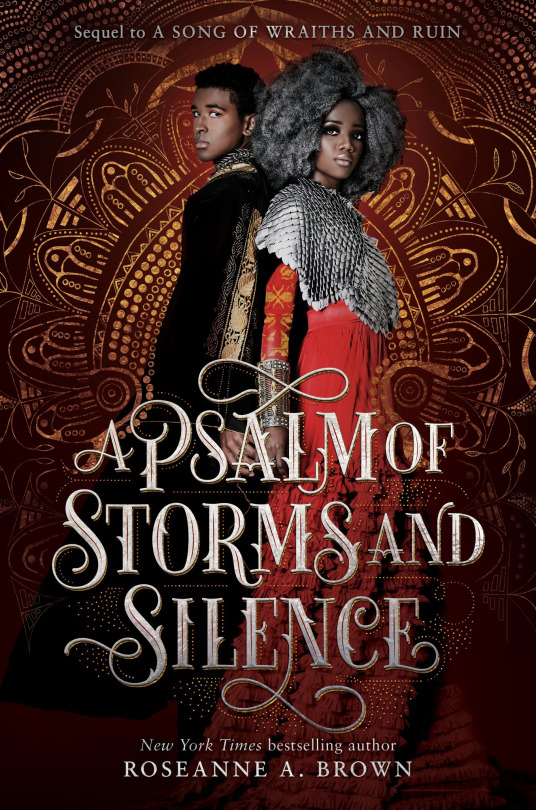
A Skinful of Shadows by Frances Hardinge
Young adult, historical. All her life, Makepeace's mother has been teaching her how to defend herself from the possession of ghosts, until one day her guard drops and a wild and fierce spirit slips in. When Makepeace's mother dies and she is sent to live with her father's family, this spirit might be her only defence. Because her family is harboring dark secrets, and they have plans for Makepeace... plans which do not care for her well-being. Unlike most other YA I've read in terms of vibes and plot, A Skinful of Shadows is a unique and intriguing read.
Vespertine by Margaret Rogerson*
Young adult fantasy. Artemisia prefers the dead to the living, and is training to become a Gray Sister, a nun who helps the souls of the deceased pass on to the afterlife rather than remain as dangerous spirits. To defend her convent, Artemisia accepts the help of a dangerous revenant, a powerful spirit which grants her great power but also could possess her the moment her guard is lowered. As evil threatens her homeland, Artemisia and the revenant must find a way to work together.
A Psalm of Storms and Silence by Roseanne A. Brown
Young adult fantasy. Sequel to A Song of Wraiths and Ruin. To save his family, Malik has made a deal with a dangerous spirit with equally dangerous demands - the death of the princess. Meanwhile, princess Karina is seeking her own power, meaning to resurrect her assassinated sister no matter what the prize. As their paths intertwine, the consequences of their pursuits keep getting higher, both for them, their nation, and the entire world.
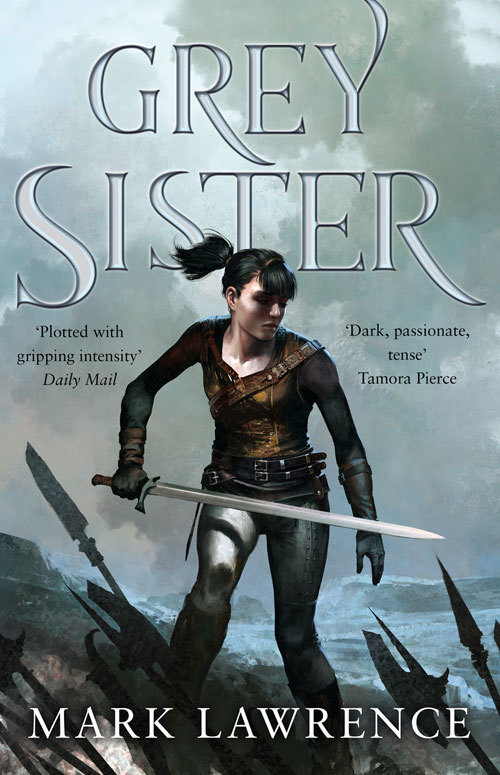
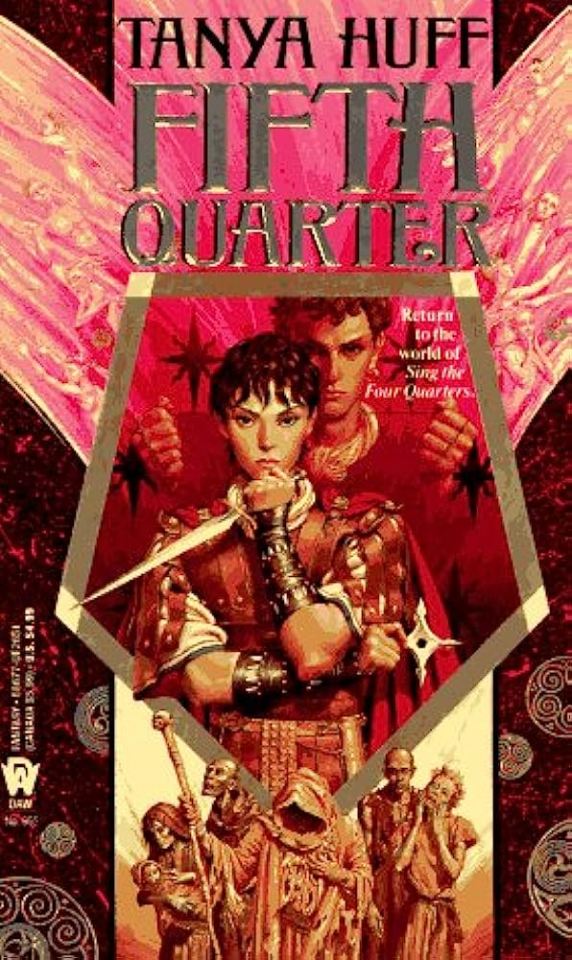
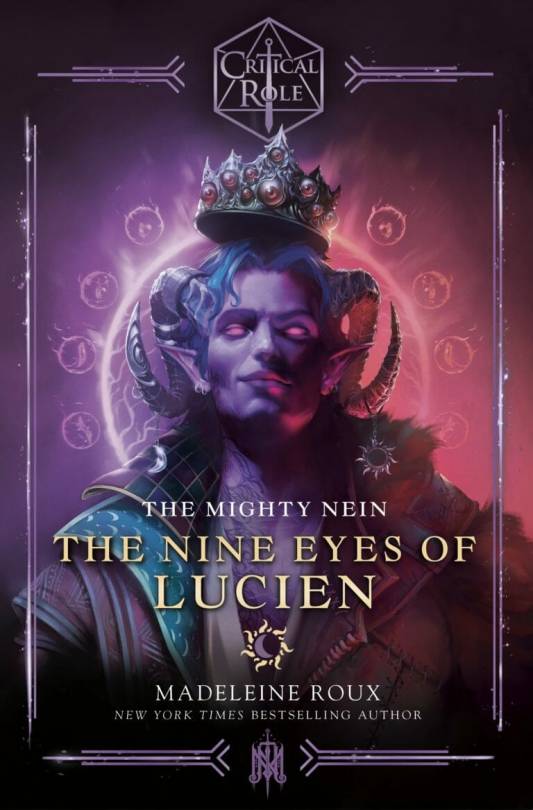
Grey Sister (Book of the Ancestor trilogy) by Mark Lawrence
Sequel to Red Sister. Fantasy with sci-fi flavor. Nona is being raised to become a killer at the Convent of Sweet Mercy. But dangerous classes aren’t Nona's only problem: her planet is slowly dying, and her own inner demons whisper in her mind. As the sun grows weaker and ice creeps ever closer, Nona and her allies race to save themselves from extinction.
Fifth Quarter (Quarters series) by Tanya Huff*
Sequel to Sing the Four Quarters. Fifth Quarter is only loosely connected to the first book in the series so you could read it as a standalone, however I still recommend starting with Sing the Four Quarters as it is very good. Bannon and Vree are siblings and highly skilled assassins, but they are put to the test when a failed assassination finds them sharing a body, their intended victim having stolen Bannon's. Now, they must choose between remaining loyal to their Empire, or helping their supposed victim find a new body to steal - and he doesn't want just any body, he wants the royal prince.
The Nein Eyes of Lucien by Madeline Roux*
Recommended with the caveat that you're unlikely to get the full experience unless you have also watched Critical Role Campaign 2 (which is quite the time investment, but very worth it). It follows the antagonist Lucien, first owner of the body we know as Mollymauk Tealeaf, both before Lucien lost his body and after he regains it in the ultimate struggle against Mollymauk's old friends, the Mighty Nein.
Bonus AKA I haven't read these yet but they seem really cool
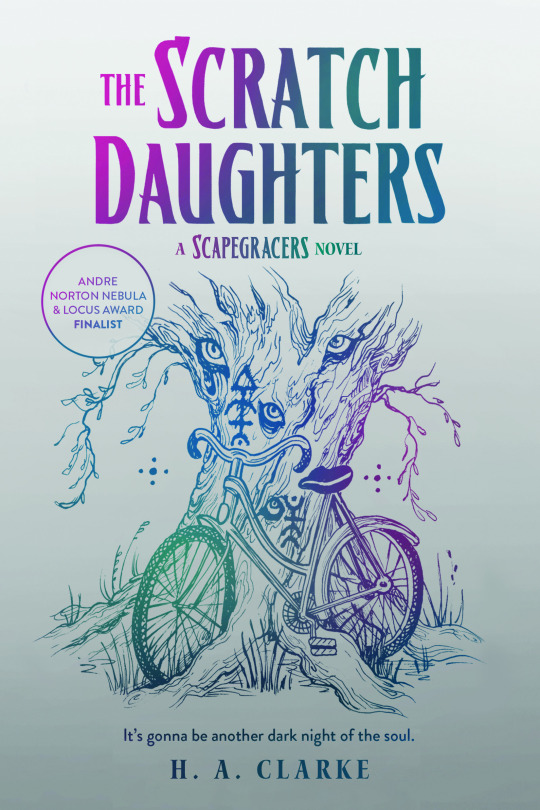
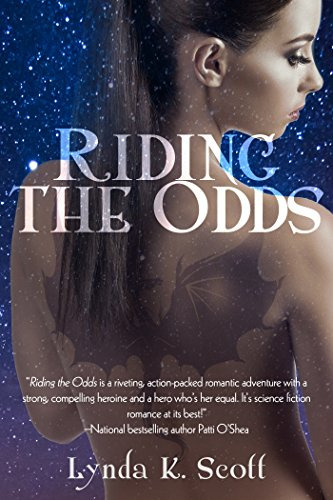
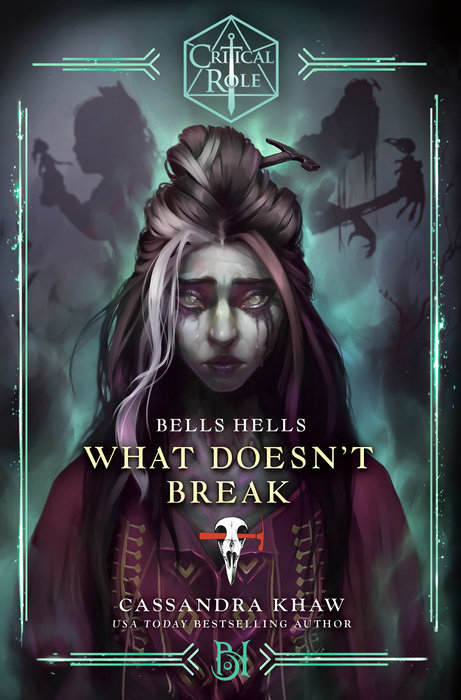
The Scratch Daughters (The Scapegracers trilogy) by H.A. Clarke
Sequel to The Scrapegracers. Sideways Pike used to be able to perform only party tricks, but in finding new friends and starting a coven, the four become powerful witches. But not everyone wants witches around. After having gotten her spectre stolen and losing her ability to perform magic, Sideways is forced to rely on Mr. Scratch, a book demon taking the place of her spectre to keep her alive. Now she must struggle to get her magic back before it’s too late.
Riding the Odds by Lynda K. Scott
Sci-fi romance. Tara Rowan is a spaceship captain with secrets - a past she wants to leave behind, and Zie, an organic symbiote which grants her greater strengths and reflexes. But when sexy Holy Knight Trace Munroe blackmails her in an attempt to rescue a missing princess, Tara's secrets are in danger of being revealed.
What Doesn't Break by Cassandra Khaw
Like The Nine Eyes of Lucien, you're unlikely to get the full experience of What Doesn't Break unless you're also a viewer of Critical Role. It follows the backstory of Laudna, undead sorceress and warlock with the ghostly presence of the necromancer who once murdered her keeping residence in her mind and tugging at her strings.
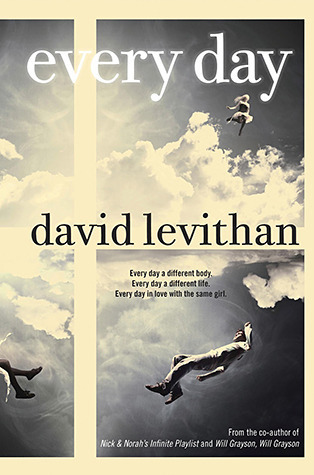
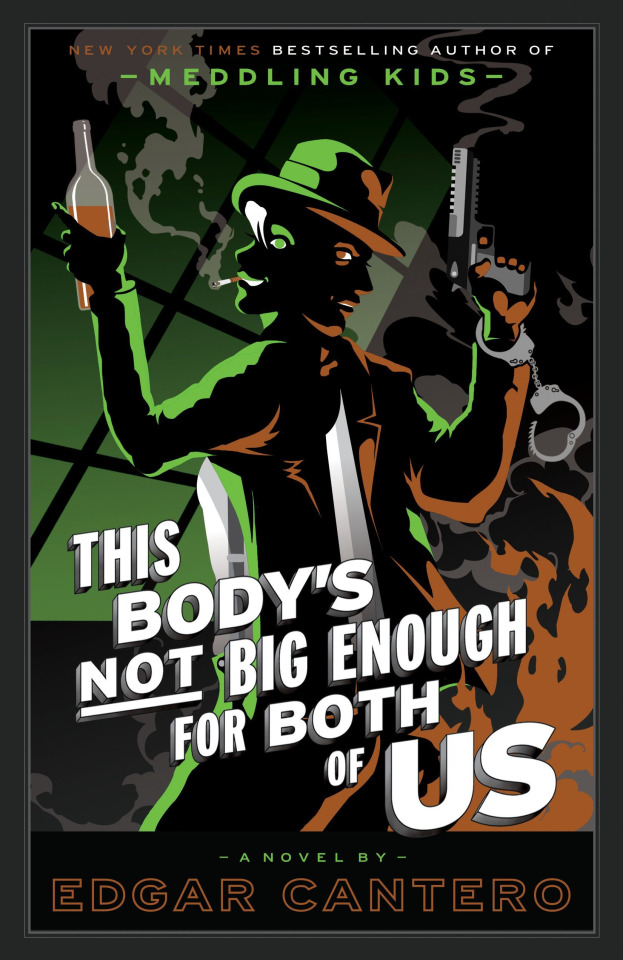
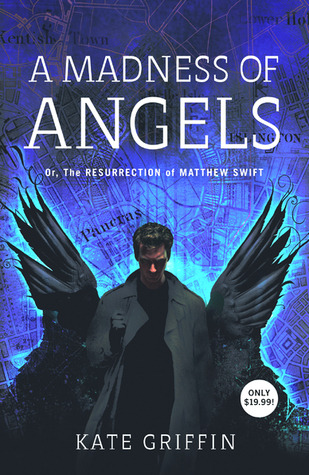
Every Day (Every Day trilogy) by David Levithan
Every day, A wakes up with a new body and a new life. A has rules on how to deal with this existence - don't get attached, don't get noticed, and don't interfere. But when A finds themself falling in love, all their established rules no longer apply. This one has also been adapted as a movie!
This Body's Not Big Enough for Both of Us by Edgar Cantero
A. and Z. Kimrean are twin siblings and private eyes - they also share the same body, calling themselves A.Z. When someone starts murdering the sons and heirs of a ruthless crime boss, it falls on A.Z. Kimrean to solve the case and find the killer before all out gang war breaks out.
A Madness of Angels (Matthew Swift series) by Kate Griffin
Two years ago, sorcerer Matthew Swift was killed. Today, he woke back up. And he isn't alone in his body... Now, he seeks vengeance not only against the one who killed him, but also against the one who brought him back.
Honorary mentions AKA these didn't really work for me but maybe you guys will like them: Bone Rider by J. Fally, The Lives of Tao by Wesley Chu, What's Left of Me by Kat Zhang, Hunter of Demons by Jordan L. Hawk, Odder Still by D.N. Bryn
#nella talks books#children of time#leech#a memory called empire#machineries of empire#my heart is human#the host#needle#malevolent podcast#goddess of filth#this alien shore#touch#the midnight bargain#brain plague#pandemonium#the unspoken name#a skinful of shadows#vespertine#a song of wraiths and ruin#red sister#fifth quarter#the nein eyes of lucien
60 notes
·
View notes
Text
“we’ve never had a gay Holmes movie” does “Tchaikovsky was not an isolated case” mean nothing to you people
#solreefspeak#sherlock holmes#I’M JOKING.#i’m quoting a niche adaptation from 1970 and i do agree we need more queer holmes in whatever form that takes
4 notes
·
View notes
Link
Of interest to all TPLOSH fans, film score buffs, and others: this remastered edition of the Miklós Rózsa score looks great.
11 notes
·
View notes
Text
It would have to wait til next month ofc, but testing the waters here - would anybody be interested in a meta series on the music of Sherlock? I’ve never seen it done fully (I know M theory uses a lot of music, but not a meta series that’s just on music) and I think it would be funky - not as a particular *prove tjlc* but more of a general exploration, although obviously this whole effing show seems to come back to tjlc no matter which way you look.
anyway let me know if you think it’s a vibe! or if you think it’s been done before and I’m wasting my time!
#sherlock#tjlc#potentially meta series#would definitely name it tchaikovsky is not an isolated case#because i'm WITTY#tplosh#bbc sherlock#music meta
61 notes
·
View notes
Text
Review: Jewgeni Onegin at the Komische Oper Berlin (or: Rolling Around on the Grass in Angst is For Everyone)
I still cant believe I actually got to see this opera live. You can imagine how excited I was, simply to hear THAT MUSIC live. And what can I say? It absolutely delivers. (Also very glad it wasn’t canceled “Because of Tchaikovsky;” in fact Lensky was sung by a Ukrainian and the occasion was used for him to speak to the audience, sing for his homeland, and ask for help. Which seems better than simply canceling things or bashing a composer that doesn’t have anything to do with this war, but I am also no expert and also not Ukrainian so I will end it at that.)
I am absolutely biased and love the Carsen Onegin, but the lush carpet of grass throughout the production was certainly easy on the eyes and helped me not Long for Leaves the whole time. Or apples for that case, teehee. I really loved when golden light would shine through the trees as well, although those moments were far too few in the production, in my opinion. In general black was the rule, especially in the Letter Scene...which absolutely accentuated a sense of loneliness and isolation. However, here is my biggest complaint about this staging: Tatyana sings the whole “kto ti?” bit FACING AWAY FROM THE AUDIENCE, robbing us of a) clear enunciation of the lyrics and b) full reception of her beautiful voice and c) instead of Very Important Facial Expressions we get Hmm Interesting Arm Fidgeting for a good few minutes and it’s Very Uncomfortable. At least, I thought so.
Oh no I already went a big negative, so I might as well keep ripping off the bandaid. Second complaint: WHY IS LENSKY SO VIOLENT!?!?! He actually slaps (SLAPS!! WHAT!?! THIS IS SO GOSHDANG OUT OF CHARACTER!) Olga at the end of Act II, as well as grabbing and pulling her around multiple times against her will during the ball. Not to mention excessive physical violence towards Onegin. Who is supposed to feel sorry for him by the time his aria comes around (and of course, of course he is drinking and super drunk by the end. I believe I have seen reviews from mutuals about this production before and I agree entirely, WHAT!??! Having Lensky and Onegin fight and duel because they are drunk... is.... not okay.... grrrrrrrr. I’m going to be diplomatic here and say: at least they got their drunk vibes right. Lensky is drinking FOR the sad vibes and Onegin is drinking because it’s all gone over his head; “haha this is funny, we’re joking right!?” Lensky’s body language replies: “dude, stop messing with my Sadboi vibes. I’m 1000000% serious here.”)
Also, the way the duel ends, the way Onegin comes out of the woods... is absolutely devastating. But I stand by NOT APPROVING of him drunkenly murdering his pal and then being all bloodthirsty and savage about it afterwards in order to scare off Tatyana, who has run onstage in fright and heard the gunshots. Though again to be diplomatic, I have to respect the VibesTM from this portrayal, because it is very much a nod to the beastly Onegin in Tatyana’s dream in the novel.
On that note, I’d like to bring up that this production is extremely Tatyana-centric (as if Tchaikovsky’s opera was not already!). She is basically in every scene and the opera is set from her perspective; she is either center stage or the center of attention, or at least watching the action, in every scene except Lensky’s aria. (This does nothing to help build audience sympathy or even attention for Lensky, because even during his Act I aria with Olga, Tatyana and Onegin are onstage the whole time Flirting with Fruit Preserves and honestly hogging all the attention because we all have priorities and clearly there is more exciting tEnSioN between Handsome Stranger and Awkward Introvert and ESPECIALLY when JAM is INvoLvEd! I was really trying not to laugh and also grrr in anger because I think Olga and Lensky NEED MORE ATTENTION. But I digress.)
The pacing in this version is also an absolute fever dream. Maybe this is also a reference to Tatyana’s dream.... I was shocked and kept expecting an intermission, but the production goes all the way until the end of the duel in Act II before ANY break, and it also moves so fast (I wasn’t sure if they always stage it like that, with no break between Acts I and II, or if the merging was pandemic related to avoid Mingling Time?) In any case, the music always seemed to blend into each other, and there seems to be truly no break between the Letter Scene and the Rejection Scene, scene Tatyana is onstage, in the same place, the whole time.
IMPORTANT LITTLE DETAILS:
-- Uh.. Tatyana puts her letter in... IN... the jam jar to deliver it??! nice, you awkward lovely mess. I love it
-- not my favorite touch, but said letter is clearly a compilation of sentences/bits out of Tatyana’s books (i.e. all the romance/etc she reads) and thus absolutely not original. Which I understand I suppose, but I don’t have to like it... I feel like even Pushkin as the narrator wasn’t... dissatisfied with her letter even if it reflected the influencing materials... plus o.g. Tatyana did not just copy and paste like This Tatyana clearly did, for all a first-time audience knows watching this production, Tatyana is not only naïve and rash but also a flat out plagiarizer!!! no thank you)
-- Filipyevna is not forgetful at all in this version; at the end of Scene 1 she approaches and says “can it be Tatyana’s taking a liking to our new suitor?” directly TO Tatyana (who smiles unabashedly in response) and then after the letter scene is clearly messing with Tatyana by pretending not to remember. She throws the jam-jar-plus-letter around, as if playing fetch with Tatyana, who eventually gets mad and shoves Filipyevna’s tea and saucer out of her hands and onto the grass.
-- Onegin then ALSO proceeds to throw the jam jar around when he comes to reject Tatyana and also kind of reads over and laughs about the letter (wow meanie). He is no gentleman and kind of skips offstage at the end, leaving Tatyana to fly into a bit of a fit and throw her romance novel onto, you guessed it, the grass
-- at the beginning of Act II Onegin picks up and reads a bit of said book, which he finds lying in the grass.. and then gives Tatyana an AWFUL knowing look and throws it back to her, laughing a bit... again nodding to the whole “your letter was just a cheap copy of what was in this book! I KNOW YOUR SECRET!!” which.... okay was funny/juicy drama but also I did not appreciate it because as you know I we stan Tatyana here and maybe she isn’t 1000% original but then again who is, and we know Onegin isn’t.. Or Lensky goodness gracious. GAHHHH but the cringe effect is...effective so I suppose that is the point.
-- LOVE MONSIEUR TRIQUET he had this rad trick of lighting a candle on Tatyana’s birthday cake to the beat of his couplets. What a dude
-- Ëcossaise! Sad that there was no choreography and honestly was almost mad when the stage crew came out onstage to disassemble the palace walls at the end of the first scene in Act III, bue then it started to make sense (Onegin’s sanity was crumbling a bit, or at least his world had been turned upside down), and then two or three crew members started rolling up the carpet and kicking it into its cylinder shape in time to the descending motif at the very end of the ëcossaise repeat and that sealed the deal... I LOVE IT and so did the audience, plus honestly it is the point of the story where a good laugh is absolutely appropriate.
--Oh yes, I am already ahead of myself. First of all, during Gremin’s aria, everything goes dark at one point and it’s really just Onegin and Tatyana, he is clearly checking her out and she gets very angry at him, turns on hi m and storms away, dropping her white lily flower that she was holding. Do I need to explain!??! I believe it speaks for itself and it’s a sublime moment, absolute shivers.
-- The finale. I LOVE that Onegin is the center of attention during the beginning angstiness of the finale, usually we see Tatyana’s suffering, but I don’t think I can ever return to hearing it that way - this is Onegin’s time to suffer! And that’s how it is in the novel, too, for weeks on end. Tatyana only appears onstage as she begins to sing her lines. And THE JAM RETURNS! Tatyana absolutely slays as the regal queen she is, she is almost mean in her delivery of her rejection and suspicion towards Onegin as she struts around him in That Red Dress of Revenge as I call it, Telling Him How It Is. YES GIRL :) YOU’RE SO RIGHT. And I was absolutely not expecting her to kiss him at the end, nor to stand by while he delivers his last lines of despair was she is usually offstage by then. It was completely badass and tragic but also in a way quite wonderful in a way I hadn’t seen before, nor in a way you can experience by reading the novel; this way, it is clear that Onegin understands and also respects her decision in the end/stops fighting; Tatyana leaves him but doesn’t have to run away for him to realize the game is absolutely, for ever over. We love to see it. Or I do, at least. I believe it’s in character, too. Onegin might be an anti-hero of sorts but he does have respect. He might be desperate and ridiculous and unfair at the end in his letter and in the final duet, but he hasn’t lost all sense of self or dignity. (But anyone who wants to discuss this further with me, please do!)
,Overall, I loved the quirkiness and general feel of this production - it was funny (as I believe Onegin should be!) but also equally serious and heartbreaking. The costumes were beautiful and vibrant, especially against the rather black staging, and it was extremely dynamic despite the intimate nature of this opera (and it did indeed feel intimate). Each characterization was overflowing with personality and expression. The acting and singing were phenomenal and filled the entire opera house with energy and urgency. Therefore I say, mission absolutely accomplished... this story was made to touch people, and paired with Tchaikovsky’s music and great musical direction, it can’t help but reach out and touch each audience member (or rather grab them and give them a good shaking...)
That being said, finally getting to see this opera live also made it clear to me how subtle and, well, domestic it is... The story (besides a duel that is thankfully not uhhh so acceptable or normal in our society anymore) is nothing too sensational, surprising, or dramatic (let’s just say it’s no Il Trovatore hehe, as far as I know it’s actually one of the simplest/calmest plots so to say). Because I loved it from the start I hadn’t really considered or understood that before but now I do... I guess that’s all I have to say.
And I still can’t believe it! Ahhh! I’m so grateful it worked out.
Here’s to seeing many more versions in the future.
9 notes
·
View notes
Text
I want a shirt or a button that says “Tchaikovsky is not an isolated case.”
40 notes
·
View notes
Text
If I asked you to stay, would you?
Summary: After a tough case, Reid stays home from work. You have to check on him. He looks sick, so you take him to the doctor, and it’s your job to take care of him.
Category: Sick Fic
Warnings/Includes: First couple paragraphs are sad criminal minds things, but feel free to skip that, and mention of puke
Word count: 4k
Written in (gender neutral) second person.
The piercing cold, and slight drizzle falling out of the dark sky around, adding insult to injury. Spirits were low, as rain washed a child's blood from the dirt. The case had not gone ideally; two lives lost, and the team just had to walk away.
A somber walk back to the cars freezing water hitting, stinging his face. Reid’s nose was red, clothes and hair sopping wet, freezing. He got to the back seat of the car, he pulled his knees up, and let his head fall onto his hands. Morgan and JJ waited outside the car, giving the kid a minute alone.
The drive back was quiet, JJ glanced back ever so often hoping Reid had fallen asleep, but every time she’d look back she would see his head pressed against the window, eyes darting with every opposing car. The street lights passed over, illuminating his face, and a shine lingering in his eyes. She’d put a comforting hand on Reid’s knee, like a mother would on a long car ride.
In damp clothes he finished his reports, and finally left the office at two.
He entered the subway tunnels, light coming out as a path marker. The eerie feeling that comes with two a.m. is in the lingering, on the streets, in tiled subway tunnels, and definitely present in anything the moonlight touches. There is a surprising amount of people on the subway for being so early. A man in the corner, held a bag with paper towels in it. A little farther along was an old bag lady. Finding someone normal to sit near was going to be too much to ask for, until he saw a woman, sleeping and seemingly destitute, a baby squirming on her lap. He waved. And she returned it.
So he sat. He was talking to her, and playing with her. Doing magic has always gotten him far with kids, except when he was one. She squealed as he pulled a coin from behind her ear and he laughed along. She laughed at the look of him smiling, and when he leaned in to make funny faces at her, her giggle turned into a cough. He patted her back a little bit, to quiet her barking cough, trying to not wake the baby’s mother. If you’re tired enough to fall asleep on those plastic seats, then any sleep you could get must be a blessing.
His stop neared, and he pulled 20 dollars from his wallet and slipped it into the woman's purse. He also shook her shoulder to wake her up, his conscience wouldn’t allow him to leave the baby unattended.
“Sorry for waking you, I just thought…” He said nervously, and awkwardly smiled and waved goodbye to the baby.
“Thank you,” she whispered. And she started to pat the back of her daughter.
He got off the metro happy, and walked the rest of the way to his apartment, the yellow glowing street lights making the falling rain sparkle as it fell to the earth.
He got home and wanted to get some sleep before he had to get up and go to work at nine. He didn’t want to shower and change, he could do that in the morning. He threw a soft blanket across the couch. He sat down, and kicked his converses off of his heels. He laid down, wet hair hitting the pillow.
***
You walked up the stairs to his apartment. You have twenty minutes until your lunch break is over, but when Garcia told you to check on Reid you knew you had to. He has a tendency to shut everyone out; say he’s fine when he’s actually far from. He would say he’s fine until he literally exploded.
You walked past apartment #19, #20, past an empty coffee cup on the floor, #21, then you ran back, picked up the coffee cup, and threw it away at the end of the hall. Apartment #23, you knocked. “Hey Reid, you there?” You tried knocking harder. “Hey kid let me in!” You were about to pound the door down like you were the cops, but you heard a click. Reid unlocked the door, and squinted at you.
“Why,” he cleared his throat a little, “Why are you here?”
“Hi, it’s 1 in the afternoon, you didn’t show up to work today, and apparently you guys
had a particularly bad case last night.”
“It’s one?” he said walking back into his apartment, to go find a clock.
You walked in, and straight to his kitchen, to wash your hands after touching that coffee cup.
“You didn’t purposely not come in today?”
“No, you’re insistent knocking woke me up.”
“So, you’re wearing your clothes from yesterday?”
“Yeah, I’d gotten home late last night, or actually early this morning, I guess.”
“Are you feeling okay?” You looked at his hair that was sweaty and stuck to his forehead.
“Kinda tired, I guess, but I’m fine.” He said staring off, trying to focus on how he actually felt.
“Here let me feel your forehead.” You reached up and pressed your hand to his face. You couldn’t tell, because you had just washed your hands rendering them cold. You ran your hand through his hair, and kissed his forehead. It was warm. His face turned red, and it came in splotches.
“I think you’re a bit warm. Would you like to try to get to the doctor before they close walk-ins?”
“No, I’m fine.”
“Then I’m going to go back to the library. I hope you find a good excuse for not going to work today,” You said, but couldn’t make a move for the door.
“If I don’t go, will you leave?” He asked, raising his eyebrows.
“You look really red, your face felt pretty warm, you slept in your wet clothes last night, and you may try to mask the fact that chills have been making you vibrate in front of me, but there is no way your not sick, no matter how many times you tell me you’re fine.”
“Okay, but I am fine.” He said, arms crossed, before heading to his bedroom to get dressed.
You waited in his apartment, absentmindedly flipped through some of his books. There were stacks of books everywhere; every spot you could fit a book, there was one. Two stacks of books were towered on his coffee table. On top of one was The Bell Jar by Silvia Plath, you hadn’t read it since high school, but you remember it being forward, and a bit unnerving.
Reid’s door opened, startling you. He walked out wearing a striped shirt and a sweater, with his signature mismatched socks and Converse. He looked comfortable, and very childlike.
“Are you ready?” You asked him.
“Yeah, I’ll grab my keys.”
“You drive?” You ask, never having seen him drive, you just assumed he didn’t or didn’t know how. How could you assume there was something that Dr. Spencer Reid didn’t know how to do.
You followed him down stairs to the parking garage, to a 65’ Volvo. “This is your car?” You asked.
“Yeah?”
“It’s so cool, I did not picture you driving something like this.” You didn’t picture him driving a cool older car, but you also didn’t picture him wearing mismatched socks, or dressing up for Halloween every year without fail. At this point nothing he did would surprise you.
“You didn’t picture me driving something cool? So, you don’t think I’m cool?”
“Well now I think you're cool, I mean after seeing this car.”
He pressed the volume button to turn on the radio, Tchaikovsky, the universe is restored. It was a ten minute-ish drive to the doctors. He signed in at the front desk, and you went to sit down. There were two seats under a window that you chose. The dark green vinyl was hot from the sun, but it was the only two isolated seats that you could see, other than the two girls that had the seats leaning on the wall. One of the girls had her hand under the other's skirt, and were kissing, very passionately. Hope one of them isn’t sick. You picked up one of the magazines next to you to avert your eyes. Home decorating, not the best option, but the bright colors and Pinterest mom’s will definitely keep you occupied.
Reid walked over to you and sat down, you could see him looking at the girls in the corner, and his face had bright red splotches on his cheeks. “Hey, are you into this?”
“What? No!” he said in a high pitched voice, like that of one of the chipmunks in Alvin and the Chipmunks.
“Then why is your face bright red?”
“Maybe because the seats under the window are hot, and you shouldn’t be touching those magazines. They are one of the grossest things in here. Actually, the pen used at the front desk is, it has 46000 times more germs than the average toilet seat. That’s why I bring my own.”
You set the magazine down. “Hey is your face warm, you're still bright red?”
He looked over at you, shrugged at you and did his little awkward smile, and looked back down at the ground, head resting on his hands, elbows resting on his knees.
“Spencer, Spencer Reid!” A woman yelled from the doorway.
Reid smiled and waved as he stood up.
“Wait, do I come in with you, or should I stay out here and see if I can join a thruple with those two?” He grabbed your wrist, seeing as to not touch your contaminated magazine hand, and helped you up to follow him in.
You guys walked back and the NP asked him to take his shoes off to step on the scale, he stepped up, a lime green sock and one purple striped sock now showing. “153 pounds,” the nurse said.
“Now stand over here so we can get your height,” You picked up his shoes for him, as she guided you across the hall to mark his height. He stood, back against the wall, “Okay, stand up straight.” He rolled his shoulders back and tilted his chin up. “6 foot 1 and ¼ inches”.
You passed his shoes back to him, following the nurse to one of the rooms in the back. You got to sit in one of the chairs that mom’s would sit in and talk for their kids. He hopped up on the bench, with a crinkle of the paper.
“The doctor will be in shortly,” she said, right before the nurse left the room.
Reid scooted back against the wall, letting his head fall back. You looked over at him, his face still looking flush, and his eyes were closed as he sat there.
A knock on the door interrupted your observation, but made Reid sit up, attention now focused on the man. “Hi, I’m Dr. Bradman. What brings you in today?”
“I don’t…” Reid said looking over to you.
“His face has been a bit flushed, and he may have a low fever,” You said for him. “Oh, and he was out in the rain and cold last night, I don’t know if that would do anything.”
Reid piped up to say “Actually, being in the rain and cold doesn’t affect whether you will get sick or not. Being exhausted, stressed, under emotional duress, and having allergies with symptoms pertaining to nose and throat are the main reasons people get sick. Other than catching if from someone who is contagious.”
“Hey, that’s my line,” The doctor said, sitting down on a chair with wheels.
Reid awkwardly smiled, looking down at his hands.
The doctor took Reid’s temperature, asked him a couple questions, and left for a couple minutes.
You and Spencer sat in the room for a couple moments in silence, he was looking sicker by the moment. And after a while of silence, his head resting on the wall, eyes shut, the doctor walked back in.
“It looks like you are sick, your temperature was raised a bit, and the redness on your nose and cheeks is a common symptom of sixth disease.”
“Wait, that’s roseola, right?” You asked.
“No, that’s only for children under the age of three.” Reid said, slightly perplexed.
“Well yes, but it can occasionally affect adults who’ve never contracted it as a child.”
Reid’s shoulders dropped, “How long will it last?”
“It should clear up in the next three to five days.”
“Okay.”
“You can take medicine to reduce the fever, and stay hydrated.”
You two left the office, but not without teasing him on the way out. “I once babysat a kid that had sixth disease. He was up all night crying, do you need me to babysit you?”
“No! Just because I have a baby disease doesn’t mean I’m a baby” He crossed his arms on the walk back to the car.
“Do you want me to drive, so you can get some rest?” You asked, holding a hand out for his keys.
“Is this another joke?” He pushed his eyebrows together, and cocked his head slightly.
“No; no it’s not.”
“Can you drive a stick?”
“Uh yeah, actually. I had a truck that was manual in high school.”
He gave an impressed nod and passed his keys over.
On the way home he laid his head against the cool glass of the window. His breath, making water bead up and fall. You walked him up to his apartment, but before you left you wanted to make sure he’d be okay.
“Do you have a thermometer? I just want to see what your temperature is before I leave you.”
He walked away to his bathroom and came back with a thermometer sticking out of the side of his mouth. He was pouting, you don’t know if it was because you made him check his temperature or if he just felt sick. You pulled the stick out of his mouth after hearing the beep.
“100.3” You put your hands on his face, burning. “Do you want me to stay here for a little bit?”
“You don’t have to…” He said and raised his shoulders to shrug.
“I know I don’t have to, but do you want me to? It would be no trouble.” You said walking to his kitchen to wash the thermometer.
“Are you sure?”
“Absolutely.”
“I would like you to stay, please.”
“Okay, why don’t you go to bed and try to rest, and I’ll run to the store and get some food for dinner.”
He nodded, “How long will you be gone?” Reid’s voice broke.
“Not too long, I should be back before you wake up, but if you need me just call me.”
“M’kay.”
You walked out of his apartment, down the stairs, running your fingers across the banister. Should you grab some clothes in case you need to spend the night? Yeah, might as well run home and get the car before going to the grocery store.
At the store you pick up some soup, popcorn to eat while watching a movie, cough medicine, ibuprofen (for the fever), and you couldn’t find any Gatorade, so you bought Pedialyte (I mean it’s the same stuff, and this is a baby disease). You also got a few other things you weren’t sure he had, and headed back.
When you twisted the key into the lock is when you started to hear some slight coughing and some whines in between. So, you put the soup on the stove, and went in to check on him. His face was covered in little red spots that trailed down into his shirt; he was asleep and his hands were balled up into fists by his face. Sweat stuck his bangs to his face, and every cough made him subconsciously whimper.
Reid was asleep in front of you, looking like a baby. If people didn’t think he was a baby before, if only they saw him now. It’s hard not being able to help him, other than just letting him sleep, but when he wakes up he’ll feel a whole lot worse, so why not prolong the contentment here.
You decided to go tend to the food, while he slept. In a few minutes though, you heard him get up out of bed and a door slam. You walked over to his couch, leaning on the arm rest waiting for him to come out. A couple moments went by and you were still standing there. If he came out now, it would be like you were just standing there staring at his door waiting for him, which is exactly what you are doing. You went around the couch and sat down, moving the pillows from how he had slept on them that morning. You picked up a book from the top of one stack, and opened it, but his door swung open. Reid stood there, in the doorframe, the sleeves of his shirt pulled down over his hands, his head hung low, and tear streaks down his face. His voice wobbled when he said “I threw up.”
“Are you okay, what do you need?” You asked, looking toward the giant toddler.
“I don’t know,” he whispered, and wiped his eyes with his sleeve.
“Let me check your fever.”
He nodded. You walked over to the kitchen to where you had left the thermometer, and while you’re in there you turn the heat off of the soup. You don’t think he wants it right now.
He puts the thermometer in his mouth and stares at you with puppy dog eyes until it beeps. He takes it out and hands it to you without reading it. “102.4!” You rush over to get some medicine, and a mug to put water in. “Here take this, baby. You must be miserable.”
He closed his eyes and gave a labored smile. Taking the medicine made him wince as he swallowed.
“Why don’t I run you a cool bath, to see if we can get your fever down faster?”
“‘Kay,” he started walking back to his room, stopping to brace himself on the wall.
You wrapped your arm around him, guiding him to his bathroom. You two stood awkwardly for a couple seconds not knowing what the first move was gonna be, but you sat him down on the toilet to wait for the water to fill. You ran the bath with lukewarm water, not hot, but not uncomfortably cold. Reid sat on his toilet, knees hugged to his chest, and his face and body were sweaty.
You turned off the tap and looked at him quizzically. Reid quickly stood up to usher you out, but got a head rush and had to lean against a wall. You walked to the doorway and waited for his next move. He tried taking his shirt off, but only got one arm out; on the second arm his wrist got stuck on the sleeve. He flailed his arm for a second, before giving up and frustratedly slumping against the wall. You walked over to him, pulled his shirt over his head, and helped pick him up. You put your arms around his waist and pulled him up with little to no help from him. You two stood there for a second, holding Spencer; all of his weight leaned into you as you held him. He was shaking.
You helped him sit on the edge of the tub, and asked “How do we do this?”
“If I asked you to stay, would you?” He looked up at you with his big brown eyes.
“Absolutely.”
You helped wiggle him out of his pajama pants, and left him sitting in hot pink briefs. Then, turning around, you heard a little splash of him kicking his legs over, and then a slosh of water displacement.
“Okay, you’re good,” he whispered.
You turned back around and bent down next to the tub. He leaned his head on the edge of the bathtub and you folded up a hand towel and shoved it under for him to use as a pillow. You scooted back, and reached for a washcloth off of his counter. A small stack of them fell on top of you. You picked one up, that hadn’t touched the ground, and ran it under some cold water. After squeezing it out, you sat on the back of the tub, and dabbed it across Spencer’s forehead. He leaned his head against your thigh and looked up at you. You looked down at him, “If I knew I was staying here, I’d have run you a bubble bath.”
He smiled; you could tell his fever was going down a bit. Seeing him without clothes on, showed you just how much of his body was covered in little red splotches. They ran from his cheeks, down his chest, and stopped a little lower than his protruding hip bones.
A few moments of you silently dabbing his face was interrupted by a coughing attack, leaving Spence shaking a bit.
“Laying back may not be the best thing for a cough, why don’t we finish up in here so we can sit on the couch, maybe watch a movie or something?”
He nodded.
“Do you want me to wash your hair, it’s wet already from the washcloth,” you handed him the washcloth, and picked up the mug he drank water out of earlier.
“Yes please.” He placed the washcloth over his eyes and you dunked the mug in his bath water. You poured it over his head as he leaned back.
“Where’s your shampoo?”
He leaned forward and handed you the bottle. Johnson’s cotton touch 2 in 1 shampoo and body wash.
“You use 2 in 1 baby shampoo?”
“It’s for sensitive skin.”
“It’s for babies.”
“If it’s good enough for them, it’s good enough for me.”
“Can we at least buy you some conditioner some time?” You asked, giving him a mohawk with baby soap.
“Sure,” He said, defeated.
You pour the cup over his head again, rinsing his hair clean of soap. You handed him his towel from behind the door, and walked out, leaving the door open a little and sitting on his bed in the next room in case he needed you. In a minute he walked out in pajama pants with little cowboys on them, and a robe.
You got up, went to his bathroom and brought out a comb. “Sit,” You scolded.
He sat on the edge of his bed, you behind him brushing his hair.
Once you were satisfied with the style, you linked arms with him and went out to the living room. He started moving the books and things off of his coffee table, while you went to go make popcorn.
You came back with a box of saltines, a bowl of popcorn, and a bottle of pedialyte with a straw in it.
“Is this another joke?” he asked reading the label.
“No, they were out of the other stuff.”
You sat down, handing him the box of crackers. His laptop was open on the coffee table, and he threw a blanket across the both of you to share.
“What are we going to watch?”
“Star Trek” he said and pressed the spacebar to play it.
“You’ll like it,” he said and put his head on your shoulder. “Hey, thanks for staying with me today.”
“It’s no problem, I like hanging out with you.”
“Really?”
“Yeah, and eventually we will need to buy you some conditioner.”
“It’s a date,” he said and snuggled closer to you.
You played with his hair until he fell asleep on your lap, leaving you watching Star Trek all night, but you do like it now.
#vicficwriterchallenge#Criminal Minds#reid x reader#spencer reid#dr. reid#spencer reid fanfiction#reid sick fic#criminal minds fanfic
163 notes
·
View notes
Note
you haven't seen tplosh yet?? oh you're in for a TREAT op!!!!!!! it's SO good and might i add, very, very, unbelievably gay. if you'd like a snippet search up "holmes turns down an indecent proposal" on youtube i absolutely LOVE it. also have you seen sherlock holmes and the furtive festivity? it's a short film (abt 12 mins) on youtube but hands down one of my favorite sh adaptations it's so sweet!!!! and so even gayer than tplosh like no joke watch it asap im half-begging you lmao!!!!! love u!
No, I haven’t watched tplosh! I hope that I will get around to watching it soon. But I love that clip of Holmes turning down the proposal! Tchaikovsky wasn’t an isolated case haha
I just finished Sherlock Holmes and the Adventure of the Furtive Festivity, and omigod it is so cute!! Thank you for recommending it!
Here are the videos if anyone’s interested :)
youtube
youtube
#watson thinking mary was dead hahaha#but omigod furtive festivity was so cute and domestic#I will somehow let you know when I’ve watched tplosh anon :)#the private life of sherlock holmes#sherlock holmes and the adventure of the furtive festivity#sherlock holmes#johnlock#tplosh anon#anon ask#answering asks in the palace
23 notes
·
View notes
Text
"A bachelor, living with another bachelor, for the last five years. Five very happy years." "Tchaikovsky was not an isolated case."
2 notes
·
View notes
Text
i would like to point something out.
something small, something kinda insignificant to your actual life, yet still quite significant in the case of johnlock.
this is not bbc sherlock, but it still found its own way to be gay.
i want to point out a scene from The Private Life Of Sherlock Holmes, 1970, dir. Billy Wilder. the scene where Holmes turns down an odd request.
to provide some quick context: Holmes is talking to a woman through a translator, therefore there is three people in the room; the translator discusses how the woman wants an intelligent man to father her child so that it will have her beauty and his brilliance; Holmes was One of the Several Men offered this “opportunity”; Tchaikovsky was also a man that was offered, but he declined because as the translator says, “women are not is glass of tea,” aka he preferred his men.
here is a transcript of the scene:
“You find Madame attractive or no?”
“Oh, I find her most attractive, for a woman that is.”
“Then no problem!”
“Maybe a slight one… You see, I am not a free man.”
“Not free? But you are bachelor.”
“A bachelor living with another bachelor for the last five years… Five very happy years.”
“What is it you are trying to tell us?”
“Well, I hoped I could avoid the subject, but some of us, through a cruel caprice of Mother Nature-”
“Get to point…”
“The point is that Tchaikovsky is not an isolated case.”
“You mean you and Dr. Watson…? …He is your glass of tea?”
what is not seen in the words is the fact that Holmes nods in between those ellipses in the last line, answering that unfinished question to which you can feel free to put whatever you like — you and Dr. Watson…are dating? you and Dr. Watson…are fuck-buddies? you and Dr. Watson…are together but it’s complicated because you both feel something but neither will act upon it in fear that they might lose the other? — since Wilder clearly left it to our interpretation, thank you very much.
i’m going to be honest, i began this post with no idea where it is going to go, much less how i am ending it. BUT i still really want to point this out because Sherlock Holmes, in at least one of the many universes, has admitted very frankly that he is with John Watson canonically and he does not want to change that fact. he was offered something and he basically said, ‘nope sorry i’m taken. i’ve been happily taken for five years now.’ yeah, okay, it was a weird offer, but that does Not change the fact that Holmes brought Watson into a subject that he was completely not related to unless he was an S/O that might have some opposition on this topic. he easily could have said no and maybe offered up other people that would be willing.
anyway, i just wanted to point something out.
#god i'm probably the 2345654th person to write about this huh#im sorry everyone it's late#the private life of sherlock holmes#sherlock holmes#john watson#johnlock#tjlc#shitpost#*text#*bri rant
118 notes
·
View notes
Text
Fiddler on the Roof? A Guide to Shostakovich’s Violin Concerto No. 1

When Shostakovich began composing his First Violin Concerto in 1947, he was enjoying a period of relative calm. World War II had distracted Stalin’s government from show trials and purges, leaving artists slightly less harassed than usual. In 1942, Shostakovich unveiled his Leningrad Symphony, which won a Stalin Prize and was played across the allied world as a symbol of solidarity in the fight against the Nazis. A number of other official plaudits followed, and in 1947 Stalin ordered that the Shostakovich family be given a nicer apartment and a dacha in the countryside.
Alas, by the time Shostakovich completed the violin concerto in 1948, the situation had changed completely. Having defeated the enemy without, the Soviet government soon resumed its incessant witch hunts for enemies within. In the arts, literature was the first target after the war, but by 1948 it was music’s turn. With little warning, Shostakovich and other leading Soviet composers found that many of their works that were once praised were now banned. The rationales given were ludicrous; Shostakovich and other composers were forced to listen to long harangues from cultural apparatchiks laden with virtually meaningless terms like “formalism” and “socialist realism.” Despite having sincerely tried to understand these terms for the past two decades, many composers came to the conclusion that social realist works were simply the ones in favor at the moment and formalist ones were not. It would have been laughable if only so much had not been at stake.
Shostakovich finished his violin concerto anyway, although it would not be premiered until after Stalin’s death in 1955 (the violinist for the premiere would be the great David Oistrakh, featured below. Shostakovich dedicated the concerto to him). This was not the first time such things had happened, nor would it be the last. The concerto he wrote took the suffering of his absurd and treacherous world and transmuted it into something beautiful and profound.
Shostakovich at this time had become increasingly interested in baroque musical forms. Perhaps in emulation of some baroque concertos, Shostakovich wrote his violin concerto in four movements organized slow-fast-slow-fast instead of following the usual three-movement pattern, fast-slow-fast. The opening Nocturne is a somber, meditative soliloquy for the soloist, accompanied by dark-hued orchestral timbres.
After this introspective night music, the ensuing scherzo is a wild, frenetic dance. In this movement, Shostakovich introduces for the first time what would become his musical signature: the notes D-Eb-C-B (in German, these notes are called D-S-C-H, a cypher for Dmitri SCHostokowitsch, the German spelling of Shostakovich’s name).
Technically, the first appearance of this figure is D#-E-C#-B, but it later morphs into the more usual form. The inclusion of this motif suggests an autobiographical intent. We cannot know what Shostakovich was thinking when he wrote this passage, but one of Shostakovich’s comments to his friend Maria Sabinina after being forced to read a speech at this time seems to resonate:
“And I got up on the tribune, and started to read out aloud this idiotic, disgusting nonsense concocted by some nobody. Yes, I humiliated myself, I read out what was taken to be ‘my own speech.’ I read like the most paltry wretch, a parasite, a cut-out paper doll on a string!!” This last phrase he shrieked out like a frenzied maniac, and then kept on repeating it.
Not long after the appearance of Shostakovich’s musical signature, the music arrives at a boisterous, klezmer-inspired central episode.
Though not Jewish himself, Shostakovich noted that “My parents considered anti-Semitism a shameful superstition, and in that sense particularly I was given a very good upbringing.” Unfortunately, not all Soviets were so enlightened. Becoming increasingly paranoid, Stalin had begun an anti-Semitic campaign during WWII which intensified in 1948. Regarding the persecution, Shostakovich remarked “…how ‘this’ had started with the Jews but would end up with the entire intelligentsia.” The revelations of the atrocities of the holocaust further fueled Shostakovich’s interest in Jewish music. His inclusion of klezmer-inspired music in this concerto and a number of other works that followed may have been another veiled protest against the regime.
The third movement is a passacaglia, a type of baroque theme and variations in which a bass line is repeated as new melodies and textures are introduced above it. The bass line in this case is a heavy, oppressive figure introduced by the cellos and basses, as horns play pulsing figures and arpeggios above it. After a quieter variation for winds, the soloist enters with an expressive melody. An increasingly tense series of variations follows, until the solo violin takes up the bass line itself before returning to its original melody. The following variation features chant-like repeated notes reminiscent of the elegy from Tchaikovsky’s Third String Quartet.
This mournful music fades seamlessly into the cadenza, an extended passage for the soloist unaccompanied by the orchestra. In the concertos of the previous century, cadenzas were normally placed just before the end or at the climax of the first movement. Instead, Shostakovich places his cadenza between movements, making it seem untethered, as if we have passed into some netherworld that is neither here nor there. Suspended in this liminal space, the soloist seems even more alone and isolated. The cadenza becomes faster and more intense as it progresses, recalling ideas from the previous movements, including the DSCH motif. Climaxing with the return of the klezmer theme in the violin’s highest register, the cadenza then accelerates into the finale.
Shostakovich titled the last movement “burlesca,” an indication that fits the music’s darkly comic atmosphere. Its mad, virtuoso fiddle music brings the concerto to an unsettling, but thrilling conclusion.
Source:
Houston Symphony / Calvin Dotsey / Nov 20, 2017.
Link: Shostakovich’s Violin Concerto No. 1
Moderator: ART HuNTER →
✓ ExposiNG GREAT ART, EvERy DAy siNcE Oct 01, 2015 →
✓ suppoRT ouR ART HunT @ pAyPAL.ME →
✓ Buy My oRiGiNAL DEsiGN @ REDBuBBLE →
✓ FAcEBook pAGE →
✓ piNTEREsT BoARD →
✓ pHoTocRowD pRoFile →
#shostakovich#dmitri shostakovich#Houston Symphony#brainslide bedrock great art talk#classical music#concerto#violin concerto
6 notes
·
View notes
Text
Russian Oligarchs Are Big Arts Patrons — in the U.S. https://www.nytimes.com/2019/10/06/arts/russia-oligarchs-arts.html
Russian Oligarchs, as U.S. Arts Patrons, Present a Softer Image of Russia
Museums, the performing arts and historical sites like Fort Ross in California, where an old Russian company flag flies, have been the beneficiaries of their gifts.
By Graham Bowley | Published Oct. 6, 2019 Updated 6:02 PM ET | New York Times | Posted October 6, 2019 8:40 PM ET |
Vladimir O. Potanin, a Russian billionaire who made his fortune in banking and natural resources, has been a donor and board member of the Guggenheim Museum since 2002. More recently he gave $6.45 million to the Kennedy Center in Washington, which used some of the money to install the “Russian Lounge,” a meeting space, in the performing arts complex created, in part, by Congress. His name is now inscribed on a wall there.
At the New Museum in Manhattan, another wealthy oligarch, Leonid Mikhelson, helped underwrite a 2011 exhibition through his foundation, which is dedicated to the appreciation of Russian contemporary art. Two years later, the museum named him a trustee, a position he held until last year — three years after the company he directs was placed under sanctions by the United States government.
Fort Ross, a California state historic park that commemorates a 19th-century Russian settlement in Sonoma County, was struggling in 2010 when Viktor F. Vekselberg, another oligarch, stepped in to help financially. His foundation continued as a patron until last year, when sanctions were imposed on him and his company, and the Justice Department told the park’s caretakers to stop taking his money.
Since the fall of the Soviet Union, rich Russians have emerged as influential patrons of the arts and Western cultural organizations have often been the beneficiaries. Carnegie Hall, the Metropolitan Museum of Art, the Art Institute of Chicago, the Brooklyn Academy of Music and Lincoln Center are among those who have received gifts from moneyed Russians or the companies they control over the past decade.
Though wealthy patrons have long used the arts to advance their individual tastes and social standing, much of the Russian giving is different. While the oligarchs also promote their personal preferences and support a wide range of cultural activities, they often employ philanthropy to celebrate their homeland, depicting it as an enlightened wellspring of masterworks in dance, painting, opera and the like.
These patrons have been quite public in their philanthropy, and there is little evidence that their donations have been directed or coordinated by Moscow. But they all enjoy good relations with the Kremlin — a prerequisite to flourish in business in Russia — and their giving fits seamlessly with President Vladimir V. Putin’s expanding efforts to use the “soft power” of cultural diplomacy as a tool of foreign policy.
The effect, however cultivated, helps burnish the image of a nation whose aggression in Ukraine and election meddling have led it to be viewed by many as a hostile power.
“When Western publics think about Russia, Putin wants them to think about Pushkin, Tolstoy, Tchaikovsky,” said Andrew Foxall, a Russia expert at the Henry Jackson Society in London. “What he does not want Western publics to think about is the actions of his regime that goes to war with its near neighbors.”
The Russian giving, and the strained relations between the countries, has created something of a minefield for American cultural organizations, many of which depend on philanthropic support and embrace shared aesthetic experiences as opportunities for bridge- building. It presents them with an ethical challenge: are they putting themselves at risk, however unwittingly, of helping to promote a one-sided view of a country that the United States is officially sparring with?
Two institutions accepted large donations from an oligarch whose company had been placed under sanctions by the American government. A third took money from a company that had been similarly penalized.
In two other cases, the cultural philanthropy was endorsed by the Russian Embassy, which for years has solicited oligarchs to help it promote Russia in America.
In other instances, from California to Brooklyn, American venues have hosted performances by Russian troupes whose operations are underwritten by companies or individuals under sanctions.
None of the transactions were illegal because the Russian donors were subject to limited sanctions that only restrict access to financial markets, not full blocking sanctions that generally freeze their American assets and bar doing business with a United States business or person. Still, experts said, accepting such donations runs counter to the spirit of United States policy designed to isolate some Russian interests.
“The whole point of sanctions is to prevent access,” said Alina Polyakova, a fellow at the Brookings Institution. Yet, because of their wealth, she said, individuals under government sanctions “are still allowed into these high echelons of cultural power.”
One Russian company employed culture to continue interacting with a high-powered American audience, even after it had been put under sanctions.
The company, VTB, a Russian-government-owned bank under limited sanctions since 2014, held two galas at the Kennedy Center. The first, in October 2016, a month before the American presidential election, featured a special performance by stars of the Bolshoi Ballet. The VTB logo decorated both the stage and the uniforms of the wait staff, and VTB’s president, Andrey Kostin, spoke.
Among the people invited were at least two State Department officials, including Daniel Fried, a senior official responsible for sanctions policy who had already been lobbied by representatives of the bank. Mr. Fried, as the Center for Public Integrity first reported, declined the invitation.
“I was not going to the Kennedy Center for a VTB thing and be photographed with them,” he said in an interview. “The optics were terrible. We are not their friends.”
Several of the American arts organizations declined to comment on whether they had given Russians a platform to spin public perception of their country. The Kennedy Center defended hosting the galas underwritten by VTB, describing its role as simply a landlord. “The Kennedy Center rents to all, while providing no judgment on the content or artistic quality of said events,” said a spokeswoman, Rachelle Roe.
But it also accepted a donation from VTB in 2017. The center said it had recently decided it would no longer accept money from the bank since its president, Mr. Kostin, was placed under full sanctions last year.
“The climate has changed since 2016,” said Ms. Roe.
Surprisingly little attention has been paid to these Russian efforts, even as the Kremlin is accused of using more insidious methods to sway American public opinion and elections. The United States, of course, also employs cultural diplomacy through a program run out of the State Department whose preachy use of the Voice of America during the Cold War is well established. But several experts said the Russian version is more coordinated, more baldly designed to muddy the discussion at a time when that country is perceived by many to be overly aggressive.
Michael R. Carpenter, a former National Security Council adviser to President Obama, said he had noticed years ago how the oligarchs were using cultural philanthropy to stay in contact with influential American political, diplomatic and business leaders.
“That access can be used to advance your business interests,” he said, “or the Kremlin’s interest.”
The cultural diplomacy of Communism
Russia’s rich traditions in ballet, fine art and orchestral music did not disappear during the days of the Soviet Union. But they became quite insular.
For decades, the production of art was tightly controlled by the state. Censorship was the norm. The Bolshoi toured, of course, but some of its excursions became threadbare affairs, its programming at times chained to ideological themes.
That all changed after the fall of Communism as the wealth concentrated in a powerful set of business leaders fueled an explosion of artistic interest and outreach.
Dmitry Rybolovlev spent $2 billion in a few short years capturing works by the likes of Picasso and Leonardo.
Mr. Vekselberg, an oligarch, and Mr. Kostin, a banker, joined the boards of the Mariinsky Theater and the Bolshoi, and helped, either personally or through their companies, to send them on polished world tours.
The spending evoked an era when 19th-century Russian czars and industrialists were among the world’s most extravagant arts patrons. Some of the newly rich, after forging fortunes in hardscrabble industries like natural resources, followed a patriotic impulse to recapture Russian cultural works smuggled abroad by nobles, sold by the Bolsheviks or otherwise lost after the revolution.
In 2005, Mr. Potanin’s foundation helped finance an 800-year survey of Russian art, from icons to 19th-century paintings, called simply “Russia!” at the Guggenheim. Mr. Putin spoke at the opening.
“Such events,” Mr. Putin said, “are the best and most eloquent way to understand a country that possesses huge humanistic and spiritual potential, a country such as Russia.”
More recently, Mr. Mikhelson, whose company, Novatek, is under limited sanctions, has staged exhibitions of contemporary art, often focusing on Russian artists, through his V-A-C Foundation.
Helen Weaver, a spokeswoman for Mr. Mikhelson’s foundation, said: “The foundation’s work is always about building bridges and fostering understanding through culture.”
Several experts on Russia said that the spending by oligarchs can resemble bouquets to Mr. Putin who is known to smile on efforts to project the national interest abroad.
“That is what you do if you don’t want to do something dirtier,” said Anders Aslund, an analyst at the Atlantic Council. “You are a patron of culture if you are trying to escape tougher demands from the Kremlin.”
A spokeswoman for VTB, the bank under limited sanctions, said in a statement “that the state or its representatives do not influence VTB’s decisions to sponsor museums, theaters, artistic groups. If we get any requests from state representatives, we review them according to standard procedure.”
But the Russian government has made clear, as it said in a 2016 statement of principles, that “‘soft power’ has become an integral part of efforts to achieve foreign policy objectives.” The following year, the Foreign Ministry created a working group of advisers, including government officials and corporate executives, “to coordinate steps to strengthen Russian-American cultural ties, preserve and develop Russian-associated memorial sites and heritage sites in the United States, and implement relevant future projects,” according to a document provided to The New York Times by the Russian government.
Its efforts include the commemoration of a Russian site, Fort Elizabeth, on the island of Kauai, to mark the 200th anniversary of a Russian presence in Hawaii.
Some of the philanthropy was driven by the former Russian ambassador to the United States, Sergey I. Kislyak. A master networker in Washington, Mr. Kislyak helped arrange Mr. Potanin’s gift to the Kennedy Center, solicited help for Fort Ross and spurred an American philanthropist, Susan Carmel, to create an institute at American University that promotes Russian culture and history.
The ambassador later became entangled in the controversy over Russian meddling in American affairs. He returned to Moscow in 2017. The embassy he left behind declined to comment further on questions The New York Times posed about Russia’s pursuit of cultural diplomacy.
“If the purpose of your article is ‘to investigate,’ rather than to promote Russian-American cultural ties, I’m afraid we cannot provide you further assistance,” said Nikolay Lakhonin, the embassy spokesman.
Michael McFaul, the American ambassador to Russia from 2012 to 2014, recalled how Mr. Kislyak once told him that he had employed Russian culture as a tool to “get deeper into the fabric of society” in the United States. Mr. McFaul said he made limited efforts to do the same in Russia, once helping to bring through the Chicago Symphony, but never with the kind of resources the oligarchs offered.
“I remember joking with Kislyak when I saw him in Washington that he was able to convince these major business people to make serious investments,” he said.
Several oligarchs, or the companies they control, help underwrite the operations of the Mariinsky Theater, which coordinates cultural activities for several troupes that regularly tour in the West, including the world famous Mariinsky Orchestra. The organization is led by Valery Gergiev, the master conductor and ally of Mr. Putin, who, as head of state, has met regularly with the Mariinsky board.
The oligarchs resist the idea that their spending advances a national agenda.
Petr Aven, for example, leads one of Russia’s largest banks and has contributed financially to exhibitions on Russian art at the Tate Modern and Royal Academy of Arts in London, where he is also a trustee. The companies he helps direct have also helped underwrite exhibitions at museums like the Guggenheim.
But a spokesman for Mr. Aven said “he has not funded or contributed art to any exhibition at the behest of or in coordination with the government of Russia.”
One oligarch’s efforts in the United States
Along the Pacific Coast, a two-hour drive north of San Francisco, visitors to Fort Ross find a 3,400-acre California state park that was once the southernmost Russian settlement in North America.
The park recreates the 19th-century lifestyle of the Russians who scratched out an existence by farming and fur-trading long before California became a state. Visitors tour the stockade, the Russian Orthodox chapel and a windmill like the one used by the settlers. The signs are in English and Russian, and overhead the flag of the Russian company that once ran the settlement often flies.
Some exhibits note the contributions of the Alaskans who joined the settlement as well as the indigenous Kashaya. But when schoolchildren visit, they sometimes dress as Russian settlers, marching with muskets across the park, shouting in Russian, “Levoy. Levoy. Levoy.”
Left. Left. Left.
“We are working hard not to focus just on the Russian era,” said Sarah Sweedler, who runs the Fort Ross Conservancy, a nonprofit that helps operate the site, “but Russia is the reason for the park, after all.”
It’s certainly the reason Mr. Vekselberg, the oligarch, stepped up at Mr. Kislyak’s request to create a private foundation, funded by his company, to help the park. The Russian president at the time, Dmitri Medvedev, attended the signing of the funding agreement with Mr. Vekselberg and Gov. Arnold Schwarzenegger in California.
Over the next eight years, the foundation donated more than $1.5 million to the park, paying for projects like the hiring of a bilingual tour guide.
“The contribution is modest,” said Ms. Sweedler, “and the influence they wield on the program is nonexistent.”
Last year, though, Ms. Sweedler said the Justice Department told the conservancy to stop taking the money. Mr. Vekselberg and his company, Renova Group, had been among the entities slapped with sanctions by the United States Treasury, which cited “a key role in advancing Russia’s malign activities,” including its occupation of Crimea, aggression in eastern Ukraine, support of President Bashar al-Assad in Syria, “attempting to subvert Western democracies, and malicious cyber activities.”
Some sanctions are based on behavior, but many companies or individuals, like Mr. Vekselberg, were punished largely because they are viewed as influential supporters of Mr. Putin who benefit from the actions of his regime.
Mr. Vekselberg, who is fighting the sanctions, declined to be interviewed.
Ms. Sweedler views the Russian investment in Fort Ross as a harmless cultural interaction, an important counterpoint to saber-rattling. Others see something more deliberate.
“For me it did raise alarm bells,” said Mr. Carpenter, the Russian specialist in the Obama administration. “Fort Ross was part of a soft power operation.”
Mr. Carpenter said the outpost was important enough to Russia that Sergey Lavrov, the Russian foreign minister, urged the Americans to turn it into a national park.
Anatoly I. Antonov, the current Russian ambassador to the United States, was exuberant in his appreciation of Fort Ross after a tour last year. “It feels like in some Washington buildings, the air is spoiled with anti-Russian sentiment,” he said. “The air is different here. And people are different, too.”
It is far from the only cultural initiative that Mr. Vekselberg, 62, launched after making his fortune during the rough and tumble privatization of Russia’s aluminum and oil industries in the 1990s.
In 2004, he spent about $100 million to secure the return of a collection of imperial Fabergé eggs and created a museum to showcase them. Though Russia experts do not see Mr. Vekselberg as personally close to Mr. Putin, the effort synced with the president’s mission to bring Russian cultural artifacts back to Russia.
Later, with other oligarchs, he helped build a Jewish Museum and Tolerance Center in Moscow, saying it would help paint Russia in a different light.
“The average American has developed this stereotype. They have a very wary approach to Russia, with the story of the evil empire and so forth,” he said at the time. “Americans who come here to work or visit, often for business, and come to this museum will assess what is going on in Russia in a different way.”
Mr. McFaul, the former ambassador, said he views Mr. Vekselberg, whose family owns homes in New York and Connecticut, as one of the more Western-oriented oligarchs. “I do think he considers himself a bridge-builder between the U.S. and Russia,” Mr. McFaul said.
But there have been rough spots.
Last year, agents for the special counsel Robert Mueller stopped Mr. Vekselberg at an airport, checked his electronic devices and sought to question him. Mr. Mueller’s team was interested in Mr. Vekselberg’s contact with Michael Cohen, President Trump’s former lawyer. The two men had had a meeting at Trump Tower in January 2017, just before President Trump’s inauguration. Mr. Vekselberg attended the inauguration with his cousin, Andrew Intrater, an American citizen and major donor to the event.
Prosecutors say Mr. Vekselberg is affiliated with Mr. Intrater’s firm, Columbus Nova, and were intrigued by $500,000 in payments the company made to Mr. Cohen for what was described as consulting work.
Mr. Vekselberg has denied being involved in the payments, and said he is only a client of his cousin’s firm. The investigators have not accused either man of wrongdoing.
Among the organizations that have received financial support from Mr. Vekselberg or his company are Lincoln Center, Carnegie Hall, the Museum of Modern Art and the Tate Modern in London. In a 2017 accounting, a Renova official said the company had spent $13.5 million on “arts and culture” in the nine years ending in 2016.
In many of these settings, the culture being promoted is Russian. Before Renova was hit with sanctions, for example, it helped fund a series of ballets and an opera in 2015 at the Brooklyn Academy of Music by the Mariinsky Theater, which the academy described as “the beating heart of Russian culture.”
Mr. Vekselberg’s company was not the venue’s only Russian patron. A few years earlier, the Mikhail Prokhorov Fund, named after the billionaire who then owned the Brooklyn Nets, announced a gift of $1 million to help underwrite an exchange program with the arts organization: “TransCultural Express: American and Russian Arts Today.”
In announcing the gift, Mr. Prokhorov said he was happy to “share some of the contemporary culture of Russia, the place I am proud to call home.”
Catherine Cheney contributed reporting from California and Michael Kolomatsky from New York. Susan Beachy contributed research.
Six Russians Whose Money Has Made Art and Friends in the West
Published Oct. 6, 2019 Updated 2:21 p.m. ET | New York Times | Posted October 6, 2019 8:35 PM ET |
These men, personally or through foundations or companies they control, have given to arts organizations in the West and sponsored events that celebrate Russian culture abroad.
Leonid Mikhelson
Chairman and major shareholder of Novatek
GIFTS: Mr. Mikhelson’s V-A-C Foundation has the goal of promoting Russian contemporary art internationally. He has given to the New Museum, and the Tate Modern in Britain. His foundation helped to finance a 2017 show on Soviet art at the Art Institute of Chicago, which the museum says its own curators developed.
WEALTH: Novatek, which has been under limited sanctions since 2014, is Russia’s largest nongovernment-owned natural gas supplier. He also owns a large stake in Sibur, a petrochemicals company.
Viktor Vekselberg
Founder and principal owner of Renova Group
GIFTS: Mr. Vekselberg, either personally or through his company or foundation, has donated to Lincoln Center, Carnegie Hall, the Museum of Modern Art, the Tate Modern in London and Fort Ross in California.
WEALTH: Mr. Vekselberg, a billionaire, made his fortune when Russia’s oil and aluminum industries were privatized. He and his company have been under sanctions since 2018.
Vladimir Potanin
Founder and president of Interros
GIFTS: He has been a donor to the Guggenheim Museum since 2002. More recently he gave $6.45 million to the Kennedy Center in Washington.
WEALTH: He made his fortune in Russian banking and natural resources, including a major stake in one of the world’s largest nickel producers.
Petr Aven
Chairman and a principal owner of Alfa Bank and co-founder of LetterOne
GIFTS: He and his companies have sponsored exhibitions of Russian art at the Tate Modern and the Guggenheim. Mr. Aven, a trustee at the Royal Academy of Arts in London, also lent paintings from his collection of Russian art for a show at New York’s Neue Galerie in 2015.
WEALTH: His fortune is derived in part from Alfa Bank, one of Russia’s largest, and LetterOne, which invests in energy and telecoms, among other sectors.
Andrey Kostin
President and chairman of VTB Bank
GIFTS: The bank he leads has been a major financial supporter of Russia’s Mariinsky Theater, the Bolshoi Ballet and the Eifman Ballet, which have performed at venues across the United States. VTB has also given directly to the Kennedy Center.
WEALTH: Mr. Kostin is wealthy but his power stems from his role with Russia’s second largest bank, VTB, which is state-controlled and has been under limited sanctions since 2014. Mr. Kostin, who has been under personal sanctions since last year, serves on the Bolshoi and Mariinsky boards.
Mikhail D. Prokhorov
Founder of the investment company Onexim Group
GIFTS: He gave $1 million to the Brooklyn Academy of Music in 2012 for a three-year program of cultural exchanges between the United States and Russia.
WEALTH: A billionaire, he derives his fortune from Russian natural resources and banking. Until recently, he was the majority owner of the Brooklyn Nets basketball team.
#russia#oligarchy#vladimir putin#putin#trump putin#election interference#international news#nationalsecurity#national news#national security#arts and entertainment#world news#worldpolitics
2 notes
·
View notes
Text
Tchaikovsky was not an isolated case. btw. if you even care.
0 notes
Text
Metafictional Monday: Tristan und Isolde
I promise that this is not merely a veiled plea for more fic authors to include Tristan in their Holmesian works.
This blog has already covered some of Holmes’ love for grand opera, so now it’s time for a deep dive into Wagnerian music drama. Tristan und Isolde is not explicitly referenced in canon (according to this database, at least), but REDC tells us that Holmes was a Wagnerite:
‘Well, Watson, you have one more specimen of the tragic and grotesque to add to your collection. By the way, it is not eight o'clock, and a Wagner night at Covent Garden! If we hurry, we might be in time for the second act.'
I have, I realize, long headcanoned this Wagner night as a night for Tristan und Isolde, because of all Wagner’s works, it’s Tristan where you really want to be in time for the second act. It’s also an opera that’s often spoken of, in hushed and reverent tones, as changing music. (It’s a reputation widespread enough to have found its way into this charming article on electromagnetic physics, written by a kindred spirit of Holmes’, it would seem.) It broke the rules of operatic structure. It broke the rules of musical harmony. It is reliably taught in music history courses, because you can’t not teach Tristan. It opens, you see, with an unresolved chord. The entire overture leads the audience to expect its resolution; it seems to be leading inevitably up to it... and instead, the curtain rises on a sailor singing about his distant lover, lamenting their separation.
That chord remains unresolved for all four hours of the opera... until the end, the ecstatic end, when Isolde sings that impossible resolution into being, as she proclaims her oneness with Tristan and with the universe.
youtube
Oh yes. This is arguably the most erotic of operas; it is also an opera in which sex never takes place, in part because the two lovers will be satisfied with nothing less than complete spiritual oneness. “Doch dieses Wörtlein: und!” laments Isolde, in Act II (”But this little word, and!”) It’s too much of a division. What they are seeking is a physical and spiritual consummation in which, fully, it is both or none... and, following the Schopenhauer-influenced logic of the opera, it can only truly be at once both and none, through a final union that is also dissolution.
For 1865 opera audiences -- used to orchestras representing physical love in all sorts of ways -- this was just beyond the pale. It was experienced as a physical and spiritual crisis; it was written about as a moral scandal. (Wagner infamously wrote it inspired by his own adulterous affair, which didn’t help matters.) Even now, 150 years on, when everyone entering the opera house knows what they’re getting into, it is a unique experience. The sheer physical and mental tension of waiting for that resolution (for four hours) is not to be underestimated. In a good performance, the emotional tension is excruciating; in a great performance, it redefines the limits of the bearable. Did I mention that the great central love duet of the second act, in which the chord never resolves, lasts for 25 or 40 minutes, depending on whether you define it as lasting from the entrance of the tenor or the moment where the lovers beg night to descend on them? They beg, in this central moment of their love, to be released from the world, to be set free, to be allowed to forget everything outside their love, in order that they might truly live.
Ahem. And this -- this -- is what is referenced in at least two canon adaptations, to my knowledge. In Bert Coules’ justly famous radio series, it’s invoked in connection with the Cornish landscape that is such an important element in the opera, by Merrison’s Holmes in “The Devil’s Foot.” The episode has opened with Holmes and Watson’s mingled, panting breath; they’re half-drowned. When they go to Cornwall for Holmes’ recovery, he grumbles that dying would have been indistinguishable from survival... thus invoking one of the opera’s key themes, the dissolution of the boundary between death and life. Watson, bless his heart, protests that the landscape is romantic; Holmes responds by quoting part of that love duet: “so might we die, in order to [live] undivided, without awaking, without fear, namelessly surrounded by love.” The episode translates the words less exactly, condensing the text of the opera: “So let us die and never part, together for the rest of time. No more waking, no more feeling -- nameless, endless, loving, sharing, existing only in each other, wrapped in love and death and darkness.”
In the second Tristan-invoking adaptation, Granada’s “Red Circle,” the final sequence is inaugurated by Brett’s bitter pronouncement: “The law is what we live with, inspector; justice is sometimes harder to achieve.” Watson, as ever more optimistic, comments that “English justice looked kindly” on the young couple involved in the death of the piece’s villain. But Holmes -- Holmes goes to the opera. The stagehand he knew there was Italian, as were the other protagonists of the drama. It doesn’t make intrinsic sense to have this opera, this pair of lovers invoked, though there is the canon reference to the Wagner night. And this is indeed an ideal opera to invoke if what you’re talking about is impossible desire, and you want a pair of lovers for whom gender is immaterial (W.H. Auden once famously remarked that Tristan and Isolde reminded him of a pair of lesbians.) So we get Holmes, standing motionless and trembling behind Watson at the opera, weeping, anguished, as Isolde sings about a love only she can see as possible, as that chord remains unresolved, blending instead into a version of the show’s own music.
Tristan und Isolde did not premiere in London until 1882. Earlier reports in the English press had deplored it as “ugly” and having “no melody.” A cartoon responded to the premiere by representing the editor of a musical periodical as disheveled in his distress, entirely nonplussed by The Tristan Chord. (Yes, the chord has a name. It’s that special.) A later review, more measured, refused explicitly to pass judgment on the work’s “absolute and relative merit,” but did pronounce that “the unity of feeling and expression, the continuity of unremitting passion here displayed, are probably unprecedented in the history of music.” It’s a judgment in which many subsequent critics have concurred.
#metafictional monday#opera#tristan und isolde#granada holmes#brett holmes#Bert Coules#merrison holmes#Clive Merrison#Jeremy Brett#music#TCHAIKOVSKY IS NOT AN ISOLATED CASE#is this blog's music tag apparently
25 notes
·
View notes
Note
🎼🏰❤️🩹🗡️
🎼 Favorite song used in the show?
OOH man ,, well . tha theme song honestly ? mayhaps a basic answer but jdkflvkvlla it holds so much meaning to me , so ,,, ówò . ALSO THOUGH . swan lake / swan theme by Tchaikovsky . i mean ,, it maeks me mentholly iww for real djcjHSMKFKCLWKGLLVLA
🏰 Do you prefer the opening or the closing?
AAAH both r so beautiful !! i think i do prefer tha opening , but i do love tha closing as well . its so peaceful , which is nice wen you need to process an intense episode dkvklqkgkvllva
❤️🩹 Which heart shard tugs on your heart strings?
OUGH ,, i mean . tha shard itself or tha way it manifested ? or tha way it interacted with mytho ,, ? in any case , i think id have to go with Fear . that scene with mytho screaming and being carried out of the auditorium , and then what he says about tutu afterwards . its truly ,, yeah . ive drawn that scene before lol
🗡 Unpopular opinions that might get you killed?
i might truly be torn to shreds for this one ;;
TLDR; fakir is canonically an abuser and he sucks , i dont like him or fakiru . i would probably be moar forgiving about it if he got ANY sort of consequences ( narratively or through fandom perception ) for his actions , but instead ppl love to just gloss over what he did , so its maed me really bitter and indignant about it . as a trauma survivor myself ( who heavily relates to mytho ) its hard for me to look at fakir in a positive light , regardless of wether or not i can recognize his own traumas / understand why he did som of tha things he did
if you wanna hear my extended thoughts about this , theyre under tha cut !! almost wanted to hide everything under a readmoar bc i dont liek ppl being mad at me jjfkvkvllva but . well .
( abuse tw , and spoilers ? i talk vaguely abt fakirs position at the end of tha show , as well as a state that mytho is in ( hi if ur reading from discord we havent gotten to that part yet dkghkhjha but i tried to keep it vague ) . also i may be a little harsh skdjhfkda if im gonna get blacklisted from tha princess tutu fandom for this i may as well go all out )
i dont liek fakir , or fakiru . maybe id feel different about either if fakir got ANY sort of consequences , narratively or in fandom perception , for his actions . but nah ppl are happy to excuse and gloss over tha abuse he put mytho through to go " aaw look he and ahiru are so cute together " . ugh .
its whatever . i know its tha most popular ship in this fandom so ive kinda just gotta bite my tongue and deal with it / let it slide . a lot of great creators ship it unfortunately so im just liek . well im ignoring that jgkkblbla . i have it blacklisted though . rue and mytho also shouldnt have ended up together , by tha way . though i liek rue WAY moar than fakir
AND BEFORE YALL GET ON MY ASS im not saying no one is allowed to liek fakir or that no one is allowed to ship fakiru . but if we could please for tha love of goodness just . acknowledge . what fakir did to mytho . i mean shit tha guy barely gave mytho a half assed " sorry i guess " in the end , if that . iirc he didnt even apologize he just kinda said to no one in particular “ man i feel bad abt how i acted ” and then fucked off skfjhgkdrjhtba but i cant get my dvds out to double check rn
if he actually got some growth in that department , or if ppl in tha fandom didnt constantly kiss his ass , id maybe be moar forgiving about this . but seeing ppl fawn all over him just maeks me increasingly bitter . hes not some grumpy-but-cute lil emo boy tsundere , hes CANONICALLY AN ABUSER . he isolates mytho , hits him , manhandles him , gets in his face , yells at him , insults him , locks him in rooms , tells him not to listen to anyone else-- its textbook abuse that lasted long after fakir KNEW mytho was able to feel things again . ive reblogged analysis posts about this . its part of why i relate to mytho so much . how can ppl see that scene where hes pushing mythos face against a mirror going “ youre such a miserable wretch , i hate this face thats starting to feel things [ he KNOWS mytho has bits of his heart back at this point ] ” and go “ yeah this is fine , this is who im rooting for ”
and i know he has his own problems and traumas and i know hes also a kid , i know hes only . well ages are vague but ive always pictured them as liek 14-15 , maybe 16 . i know this . but again , seeing ppl fawn all over him just maeks me increasingly bitter about it . he gets off completely scott free without having to examine his actions or grow or apologize or anything . everyones just liek " yeah this is fine we dont even rlly liek mytho tht much anyways " ( out of tha main 4 , mytho gets tha least positive attention in tha fandom , which is really funny considering what a central character he is in tha show )
and yeah ppl change n whatever . wounds can heal , relationships can be mended . but fakir never tried to mend theirs . mytho never got any closure or an apology or anything and it just sucks so much . i mean yeah he got to tell fakir off as r!mytho during that one battle . but most of him being all * evil laughter * at fakir wasnt even him , you can see he doesnt even consider himself that person when hes staggering back to his dorm clutching his heart going “ what are you , who are you , whats goin on ” . mytho got to be a lil scoundrel to fakir as r!mytho but thats not tha saem as any meaningful acknowledgement / apology on fakir’s part
fakirs storyline , concerning mytho , p much boils down to " mytho and i used to be friends , but i grew to resent him . now im a coward who abuses mytho , but its okay bc he cant feel anything . oh shit hes getting his heart back ? well , im gonna keep abusing him anyways . aw man , ahiru is maeking me softer ,, i care about her ,, well !! im gonna go live my life without ever acknowledging or receiving any consequences for my past actions , bye !! " liek fuck off dkfklqjdkgklhlbla
its whatever . i guess by tha tiem tha end of tha show comes around , and mytho and fakir have both shifted to different places in tha story , ppl have forgotten all about what fakir has done and are happy to just not look back at that . but as someone who relates to mytho for many reasons , an important one being tha trauma we both went through , its not something i can forgive so easily . but i guess to most people its not that deep
0 notes
Text
Things I am grateful for #1026... I am glad I am not a lady swan

I happened upon two swans…ahem… “cygnet-making” on the Mill Pond the other day. Let’s just say I was very glad I wasn’t a swan. At least, not a female one. If I was one, I’d be lobbying for a snorkel mask.
It reminded me that I also once had the dubious honour of seeing peacocks mating on a safari in Sri Lanka. The guide was duly excited; evidently this was a rare sighting. It was indeed a sight to behold and a feat of tessellation. All those feathers.
Nature, eh? Constantly stopping us in our tracks.
What intrigued me most about the swan sex though (I can call it that now we’ve passed the awkward first mention), was that afterwards they performed an elaborate sort of mirroring display which we could only assume was a mating ritual.
One swan would gently dip its head under the surface of the water, then bring it back out and begin preening its body while its partner would then dip its head under and mirror the preening. Occasionally one of them stretched up its neck and there was tail-feather-shaking to rival Tina Turner.
It was really very beautiful and I absolutely understood how Tchaikovsky was inspired to pen ‘Swan Lake’.
It confused me though, as I would’ve thought they’d have done all of that before the big event, rather than afterwards. It was the swan equivalent of whispering post-coital sweet nothings – I guess the guy feels he’s got some making up to do after dunking the girl underwater until he’s finished the job.
This vision stuck in my head. I’ve since felt the need to Google it (with some trepidation).
My swans were Mute Swans but they were not silent in going about their business. There was quiet squeaking, a bit of soft hissing and the odd grunt. Evidently it’s a myth that they only ‘sing’ when they’re dying (the fabled ‘swan song’).
Apparently, February is quite early for swans to start breeding but not unheard of. It means they’ll lay their eggs in March and then the cygnets will hatch in April.
Their mating ritual can last anything from moments up to a whole hour! And they do the mirroring and preening thing before and after the deed itself. So, next time you see a pair of swans doing that picture-perfect heart-shaped necks thing…hang around for a bit and see if you would support the lobby for snorkels.
Chatting with my family about this made us realise that we’ve seen quite a few things we weren’t expecting in the natural world during our three Covid-19 lockdowns. Things we probably wouldn’t have seen if everyone and everything had been going about life ‘normally’, even though we have always been (forgive the double entendre), outdoor lovers.
We watched a pair of nuthatches who’d nested in a tree on our camping field – we were only there because there was no-one staying in our safari tent so we thought we’d be ‘on holiday’ at home last Easter weekend!
I saw my first otter on a beach in December, presumably because there was barely anyone around; a fox in the sand dunes and countless double rainbows – the widest and brightest I’ve ever seen. This perhaps because we have been out walking every day, whatever the weather, because it’s been essential for our sanity like never before.
It’s a privilege to catch sight of these rather ordinary events which seem to us extraordinary because we’re not often looking.
And all this breeding that’s beginning to take place in earnest is the surest of signs that spring is on its way after the longest of winters.
Hoo-bloody-rah!
** By bizarre coincidence, just as I was finishing this blog, I witnessed for the first time our son’s two corn snakes – who we thought were both boys until one of them laid eggs during the first lockdown – in the tussle of mating ecstasy. This was no Swan Lake. It wasn’t pretty, but it was pretty compelling.
With all this copulation in front of our very eyes, and with our daily lockdown walks continuing into the Spring, I’m kind of thankful for our isolated, rural existence. We only have one human near-neighbour and, mercifully, he lives on his own.
------------------------------
In case you want to learn more about swans, this is a brilliant website: www.swanlife.com
There’s even a bit about swans busking. I enjoyed a whimsical image of a swan on an upturned food tub twanging a banjo with a webbed foot and playing Piano Man on the harmonica. But no, it’s the rearing, wing-spreading and flapping they do when you’re not wanted. Who knew?!
0 notes